#a character who i have a lot in common with & who has suffered in some of the same ways i have
Explore tagged Tumblr posts
Note
Tim I noticed a lot of indigenous patches on your jacket, are you Native?
Idk what my dad was 'cause I never knew him, but yeah my mom is (or... Was.. I guess..) Muscogee, the tribe native to the part of Alabama I'm in.
If I remember correctly she came to Alabama from Oklahoma (where a lot of Natives were displaced to in the 1800s) to "get back to her roots."
But yknow, I was separated from her in childhood (which tbh is upsettingly common for Native families) and I was raised in a very white very Catholic asylum so I'm not as connected to the culture as I'd like to be.
-Tim
#OOC: Olea speaking#this is kind of a self-indulgent headcanon but HEAR ME OUT it adds a lot to Tim's character specifically#we're talking about a character who was separated from his mom in childhood and locked up in a psych ward#suffers from chronic physical and mental illness made significantly worse by the institution that was supposed to be helping him#forced to regulate his emotions more than other people have to so he isnt misinterpreted as a threat#struggles with addiction#had to work twice as hard as anyone else in his friend group just to be given the same opportunities#a much more common experience inside BIPOC communities#and he clearly has ties to the land (especially the park) nobody else has#you know how in season 2 Alex starts yapping to Jay about how the park is cursed?#maybe he was right#maybe that *thing* has been here for hundreds of years#and nobody was ever able to settle the land so eventually the Department of Conservation turned it into a state park#and Tim isnt some random “patient zero”#but he has ancestral ties to the land and was more receptive/at risk to Operator Sickness (but was also more resistant to it long term)#JUST SAYIN 👀#im half Katu and I desire my comfort character to be a halfie with me we need more non-white rep in mh#ask.txt#marble hornets#mh#tim wright#afterlife au#slenderverse#Native!Tim
138 notes
·
View notes
Text
Porfiry telling Raskolnikov that at least he was honest and in one bound took the furthest leap to put his theory to the test of actual action——
#Taylor believing a man who is obviously lying to her#like. it’s fascinating to me how they’ll say anything to her and she’ll be like ‘okay let’s go’#she’s never read Jane Austen and it shows. but that’s okay because she’s the character in an Austen novel#she has no sense of self-preservation she has no common sense when it comes to love#and the reason I have endless patience for that is because she IS different. she is extraordinary. she is WEIRD. she’s so needy#so angry so fragile so stupid so brilliant so completely helpless#like the bolter———I can’t even LOOK at it right now#because you know she was like this since she was 5 and SHE knows it#just so. Different. so strange. I mean she ruled her family with an iron fist from the age of 11#and her packaging is so basic and she she had so much access to everything anyone could want#so there are none of the usual marks of someone being so Different#but like. people HATED her from day one. you know her own strength of personality was drawing out many people’s hatred or envy#and she’s so helpless in her own personality because she can never change#like thank you aimee? or whatever? heck yeah there was some girl who bullied her and brutalized her on the playground#and you know it devastated Taylor from day one and still does#and it’s just. I don’t know how people can’t see that someone with that extraordinary set of gifts#wouldn’t also suffer in such an extraordinary way#and ways that elicit so much scorn and non-sympathy because people are unsettled and jealous and annoyed by her#because she WILL find a way to win#but isn’t that proof enough that she is the very OPPOSITE OF NORMAL#it’s why people have to be like ‘oh she sold her soul to the devil for this success.’ or whatever the psy-op spy thing is#because there’s no human way to explain her success if she really were as basic/talentless as people say#ugh this is all so incoherent and irritating and I’m so sorry but I just. I cannot explain how protective my heart is of her#and all the many many mistakes she’s made and the prisons she’s made for herself because she’s LIVING the tragedy#of never having denied herself one time/getting everything she wants#and discovering the poison at the bottom of everything she reached for with desperate hands#like. I love her so much and I am so protective of her because she is so helpless and she is getting shot in the face every time#and she feels every blow!#whew I need to turn off reblogs and will probably delete but I just#this album is all of her spilled out and people DO hate to see it because a lot of people hate her!!!!
8 notes
·
View notes
Text
ANYWAY
it doesn't matter, because the whole time i was suffering in that situation, Ignis (a much better chef than any of the people at that restaurant) was waiting for me on the other side
#that's why i say FFXV represents me learning to love myself#because the whole time i was in the restaurant industry i carried myself as an absolute door mat#and was subjected to all sorts of abuse as a result#because i cared way more about being 'normal' than being true to myself#which meant depriving myself of the things that brought me joy and putting all my effort into my job & coworkers#so i could be 'liked' and have a social circle#except most of those people took advantage of me and i was never good enough no matter what i did#it wasn't until i got out that i made the conscious decision to 'let myself' be autistic again#which is what led to me discovering FFXV and is how i found Ignis#a character who i have a lot in common with & who has suffered in some of the same ways i have#i honestly feel like the universe gifted me with Ignis as a sign to live the rest of my life as myself#and my self-confidence & sense of self-worth have grown MAGNITUDES as a result
4 notes
·
View notes
Text
ORORUN REDRAW GUIDE !
i think we’ve all seen the atrocity that is genshin’s unreleased character, ororun. the entirety of natlan is a mess really, but as a yoruba person myself i CANNOT keep quiet about ororun specifically.
outside yoruba mythology, in yoruba, ‘Olorun’ (the name ororun is based on, pronounced o-law-roon , with o pronounced as in orange and the ‘roon’ pronounced shortly, not dragged on at all) is actually the same word we often use to refer to God in Christianity. Christianity is the primary religion among us yorubas so honestly, i was kinda glad they misspelled his name. it would feel SO disrespectful referring to whatever that thing is with the same word we use to refer to God who we actually worship. religion aside, genshin’s depiction of Olorun (cultural god, not Christian one) is downright disgusting. i’d never paid too much attention to genshin and its poor representation, but now that my culture has fallen victim to it, i completely understand all the outrage.
edit: please note that while we use ‘Olorun’ to refer to the Christian God, Olorun is just a general word for ‘god’ itself ! for example if i say “God in heaven” and “god of thunder” we know i’m referring to two different beings, in yoruba it’s the kind of the same—the same word is used to refer to both the Christian and other gods, but we know it’s different, even though olorun can be capitalized regardless of what god we’re talking about (unlike english where the Christian God is capitalized and other gods aren’t) at the end of the day though, when we say “olorun” even without context, we are usually referring to the christian God !
1. PLEASE DO NOT DRAW HIM WITH ANIMAL EARS !
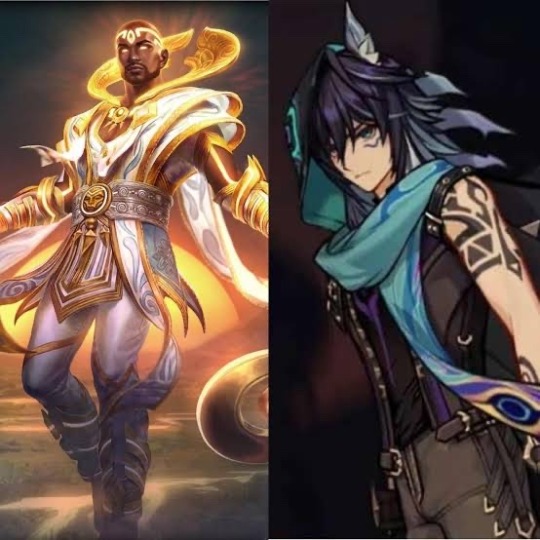
i’ve noticed that hoyoverse has this nasty habit of portraying every dark skinned character as wild or animal-esque. kaeya seems to be the only exception to this. even xinyan, though lacking any animal features, has this wild energy to her. some might call it a stretch, but i feel like her features are pretty feline in comparison to other liyue characters.
Olorun in our culture is the supreme god of the heavens. In my opinion, it is disrespectful to liken him to something akin to an animal. normally i wouldn’t even mind that much, but with how hoyo makes its few dark characters more and more like animals, i can’t help but feel weird about it. its really off putting.
2. HIS HAIR WOULD NOT BE CURLY !

majority of nigerians have 4C HAIR. not wavy hair or loose curls. some have 4B, but 4C is the usual here, that is, kinky or coily hair. Olorun is often portrayed as bald in traditional art, but trust me if he had hair his hair would resemble his people’s, not Tyla’s.
DREADLOCKS ARE A YES ! outside nigeria, locking hair is pretty common, but in nigeria a lot of people have locks naturally. our hair sometimes just grows out that way, no treatment no nothing. dreads are 100% an appropriate style, they look good asf too.
3. PLEASE USE CULTURAL FABRICS IN YOUR DESIGNS !
when i saw ororun’s outfit, i almost started crying. they couldn’t even bother to dress him up a little. they really dressed my brother in a scarf and cape and called it a day 😭 upon how fashionable we nigerians are know to be, hoyoverse still made it their mission to embarrass us stylistically. God knows my people have suffered man 😭
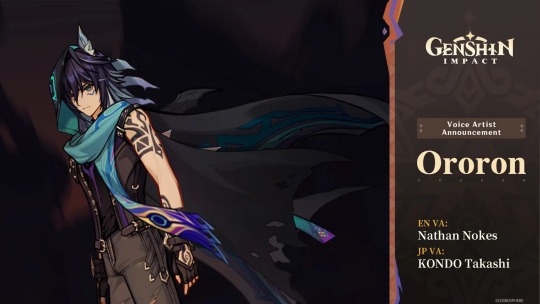
ankara is a traditional nigerian fabric that features bright colors and lots of patterned designs. see below:
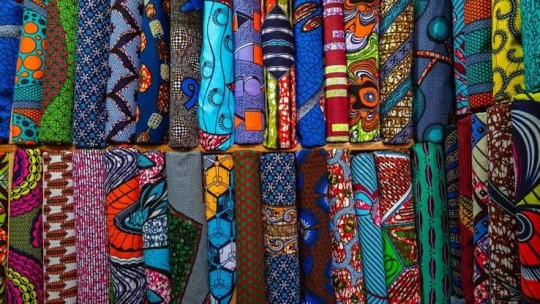
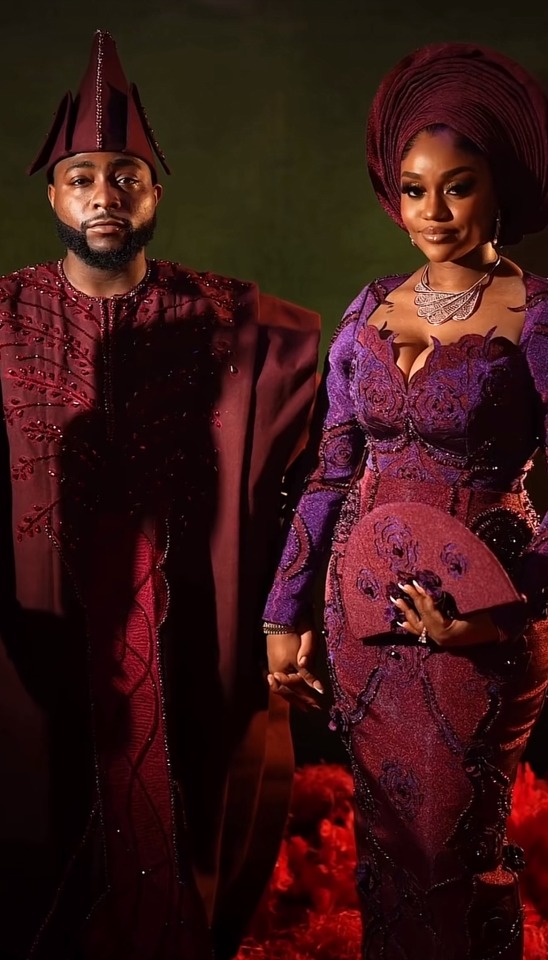
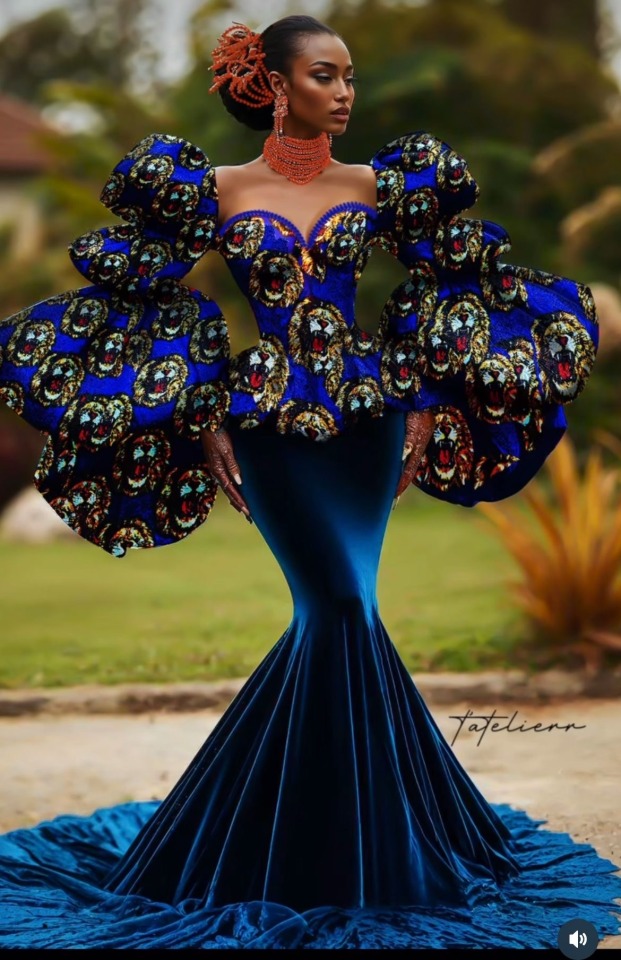
here in 9ja, we love our ankara. it’s a big part of our fashion here and trust me it would look excellent in your designs. it’s perfectly fine to draw ororun in normal fabrics since he’s a deity and it’s not like ankara existed back then, but if you really want to represent nigeria, ankara is a must 🙏
i’m going to address another fashion piece because if you search up nigerian fashion you’ll see it a lot: beads.

these orange beads are igbo (another tribe here in nigeria) NOT yoruba. does this mean you can’t use it in olorun’s design ? no ! let me explain. tbh, here in nigeria there’s a bit of...tension between clans. it’s not that common, but older people are definitely a lot more tribalist. as a yoruba i love my igbo brothers and sisters, i truly believe they’re the most fashionable clan and i adore their festivities, they always go over the top. please, just look at them:
(only one image because of image caps, ugh)
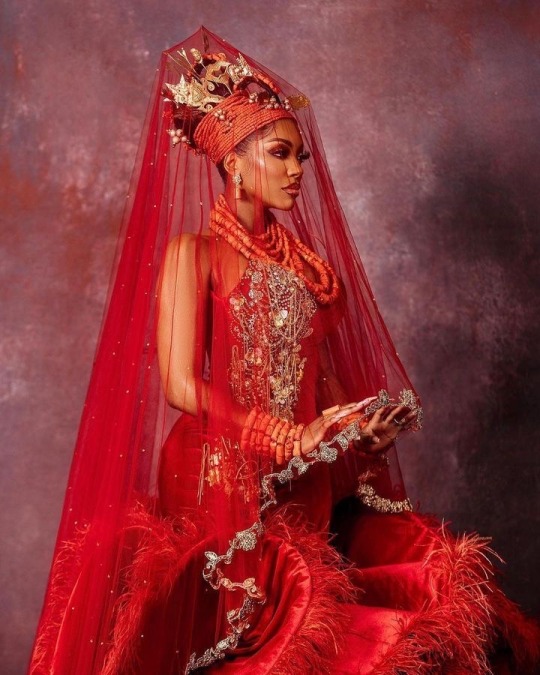
anyway, we yorubas wear beads too. but the specific way the beads are worn around the head and in multiple layers round the neck is igbo, not yoruba. though i personally wouldn’t care too much if i saw olorun with igbo beads since all i want is for him to at least look nigerian, at the end of the day he is a yoruba deity. it might be disrespectful to dress the god of one clan as if he belongs to another, especially since there is so much historical ( and very slight but uncommon present ) day tension between both clans.
here’s a more yoruba outfit. sorry yall, it might be hard for you to distinguish if you’re not yoruba or igbo, but a lot of nigerians can tell the difference at a glance. ( actually nowadays, there is so much overlap between yoruba and igbo fashion, but there are many specific styles that may be associated with one tribe and not the other, for example how beads are worn in the above paragraph ) please do your research, he’s not only a nigerian god, but a yoruba one.
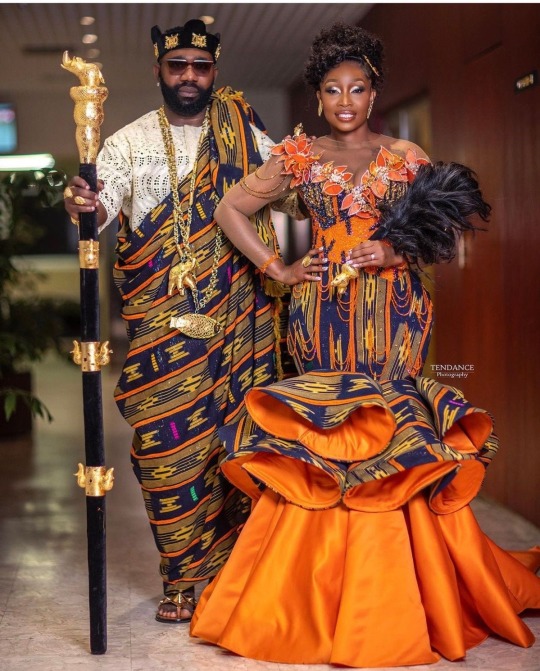
one more thing, because i know it will start discourse : skin tone.
nigerians have a very diverse range of skin tones. some of us are so pale, if not for our afrocentric features we could maybe pass for another race. however, ororun is yoruba.
light skinned nigerians are usually igbo. not to say that yorubas can’t be light skin, but here in nigeria if you saw a light skinned person, we’d automatically assume they were igbo. igbo people usually have lighter skin tones. majority of yorubas fall on the more milk to dark chocolate end of the skin tone spectrum. i’m saying this now because i know a lot of people are going to start arguments over ororun being redrawn as ‘too light’ or ‘too dark.’ i don’t really care about complexion, but i thought i’d help you all get your facts right.
that’s it ! if you read all this i’m super thankful. i don’t usually post about this kind of stuff but i honestly love my country and could go on about it for days. nigeria is such a beautiful place with a diverse range of cultures— from hausas to fulanis to so many more. natlan was supposed to be Africa’s time to shine, as well as latin americans, but hoyoverse said fuck you and your people. they did this to an extent with sumeru but natlan was done straight up dirty—not a single melanated character in sight, and the only one who does have melanin, iansan, looks so desaturated you might as well call her grey. i saw someone on tiktok call mualani a dark skinned character—it was at that point that i knew genshin was done for.
please REBLOG this post so it reaches more people and artists in the fandom !! this is literally the third time i’m making this post because tumblr refuses to show it in the tags for some reason 😭 i encourage other cultures who feel misrepresented to make posts like this too. it’s a perfect opportunity to educate and inform people about the diverse cultures genshin has once again failed to represent properly.
Hoyo has never been one to make customer satisfaction their top priority, but we’ve been able to call them out before and i truly believe we can do it again. Natlan is not poor design choice. it is blatant racism, a nation based on POC ethnicities with not a single colored character insight. Hoyoverse has been able to escape racism accusations for as long as i can remember, but natlan is the icing on the cake. we CANNOT allow hoyo to proceed as planned without giving them the appropriate backlash.
Also, if you redraw ororun using this guide, make sure to tag me here or on my main blog, @heartkaji !! i’d love to see all your redesigns. once again, thank you all for reading and have an amazing day !!
#REBLOG REBLOG REBLOG !#genshin#genshin impact#sumeru genshin#genshin sumeru#genshin natlan#natlan genshin#genshin oc#genshin fanfic#genshin fanart#genshin spoilers#genshin leaks#mihoyo#hoyoverse#genshin ororon#genshin kinich#kinich#mualani#mualani genshin#honkai star rail#honkai fanart#honkai sr#honkai impact 3rd#honkaiedit#hsr#hsr fanart#genshin redesign#sumeru#natlan#( 🛁— !! )
881 notes
·
View notes
Text
dear dead boy detective (especially paynland) enjoyers: have you yet heard of the biggest gift bestowed upon the fandom so far, aka jayden's charles playlist? the one he mentioned in interviews? well, he dropped it on twitter at 19th of may. and man, do i have stuff to say about it.
there's a lot of 80's bangers, for sure, great to get into the mood and character, but some of the choices...
i'm gonna focus on a few of my favourites, songs that made me go insane when i saw them. honorable mentions: - category 1 (so devoted the lines blur): ain't no mountain high enough by marvin gaye and tammi terrell, there is a light that never goes out by the smiths, inkpot gods by the amazing devil - category 2 (family life): family line and summer child by conan gray, seventeen going under by sam fender, matilda by harry styles, father by the front bottoms - category 3 (being queer in the 80s): smalltown boy by bronski beat, boys don't cry by the cure - category 4 (there's no heterosexual explanation for this one): good luck, babe! by chappel roan, yellow by coldplay, fight or flight by conan gray (is this about monty? the cat king? i need answers!), the prophecy by taylor swift, arms tonite by mother mother, sweet by cigarettes after sex, head over heels by tears for fears
this list is by no means complete or comprehensive!
and now, the songs that made me go the craziest: (they're predominantly in charles' pov as it's his playlist)
found heaven by conan gray
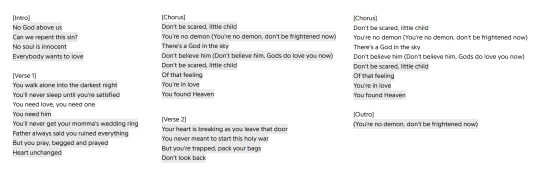
the only reason this song made it into the list and not the honorable mentions instead of smalltown boy is that it makes almost the same point, just so much more explicitly. i don't think i have to say much about it, it's a story of a young person griping with their queerness, being forced to leave home, a common theme of the playlist. "you're in love, you found heaven" when he chose edwin over his own afterlife, heavily implied to be heaven, and built his heaven with him on the mortal plane? ouch! (and we see this same notion repeated in another bop from the playlist, heaven is a place on earth by belinda carlisle).
2. like real people do by hozier
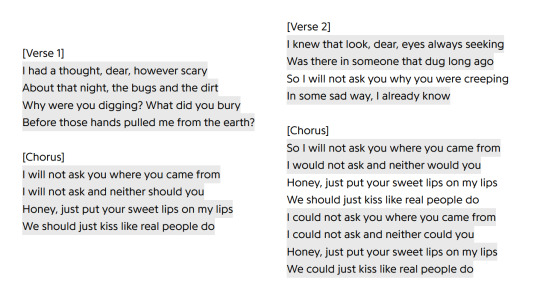
"i miss kissing" charles rowland, 202X romantic meaning aside, the verses show a sort of a common understanding the boys have around the manner of their deaths and their lives before it. we already know from the show they don't really talk about it, with edwin not knowing about the severity of the abuse charles suffered. it feels like one of them saying "let the past be past, we're together now, yeah?". but also, jayden: can there ever be a platonic explanation for this? ghosts can't touch, can't feel, so they wish they could just kiss like "real" (alive?) people do?
3. flaws by bastille
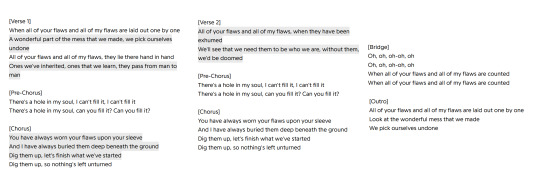
not the most romantic song, but i absolutely love how well it fits their dynamic. despite his edwardian brand of repression, edwin truly is the one that's more open about his feelings (recognising of course that in this case, the bar is so low it's in hell. haha, get it). edwin has worn his flaws upon his sleeve, and charles has held them buried - eg. bottling up all of his anger and resentment towards his family and his own death. the song presents a very sweet outlook, in which their flaws are brought up to the surface (for example, charles' outburst against the night nurse in episode 4), but they learn to accept them as they are, an extension of themselves.
4. a pearl by mitski
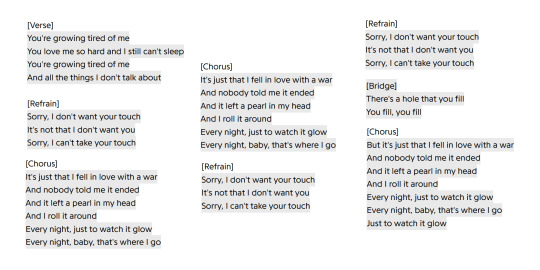
you know it's gonna get intense if there's a mitski song in the mix.
the song is about a person who finds love in their partner, someone who treats them way better than they've ever been treated - and yet they cannot bring themselves to reciprocate the affection ("it's not that i don't want you, sorry i can't take your touch") despite reciprocating the feelings themselves because of the trauma. charles is known to bottle things up ("you're growing tired of me and all the things i don't talk about"). the person in the song recognises the love the other person holds for them ("you love me so hard and i still can't sleep"), which reminds me of charles' response to edwin's confession. not a "no", but a "maybe, as time passes".
5. fair by the amazing devil
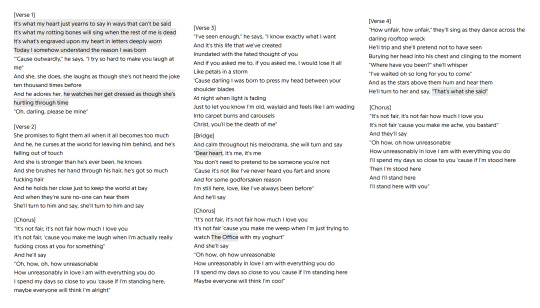
this one made me genuinely gasp when i first delved into the lyrics. it's simply so sweet, such a genuine and domestic portrayal of love. at first i thought it was way too open about being a love song (normal text instead of the subtext i'd be used to) for jayden to choose it with edwin in mind, but... there's no one else it can really be about. it's far too domestic, too "established" to refer to crystal. refers to a relationship that's laster for a longer while.
the narrator in the first verse is a person deeply in love with the other person, someone who loves to make his lover laugh and simply drinks in their presence. the "he" in the song i believe is charles, while the "she" refers to edwin. edwin promises to fight off anyone - or any feelings pulling charles down (we can see this in the first episode: "you ever think... what if death did catch us? she'd force us to go to the afterlife and split up" "i will make sure this never happens."). charles feels left behind by the world (seeing as he clings to crystal at first, refering to her as "someone their age who's still alive") and believes edwin to be so much stronger than he's ever been. i'm not going to break down the song verse by verse, but if you read it yourself while subbing out "he" for charles and "she" for edwin you'll see just how sweet (and... strangely very in character?) the song is.
6. work song by hozier
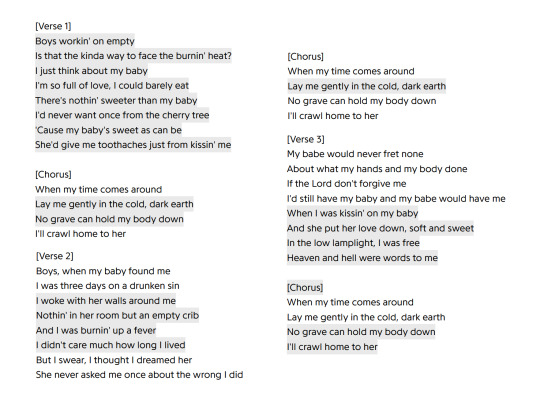
if the previous song made me gasp when i saw the lyrics, this one made me go "NO WAY" out loud when i saw the title. the first one verse is just pure toothrotting sweetness, but the chorus is what i want to draw attention to:
when my time comes around lay me gently in the cold, dark earth no grave can hold my body down i'll crawl home to her
HELLO? charles, who keeps escaping death and afterlife to be able to stay with edwin? charles, as he literally takes his last breath with edwin right there, choosing to be by his side rather than move on? charles, who keeps choosing him despite night nurse's promises and threats? charles, who literally crawled through hell for him?
verse 2, to me, can be interpreted as referring to when charles died. edwin found him at his worst, and he "woke" up with his presence comforting him. he was shivering due to hypothermia and his injuries. edwin didn't ask him about what happened or pushed him, he simply listened. the lines "i didn't care much how long i lived, but I swear, i thought i dreamed her" are pretty self explanatory.
in verse 3 we still see the same attitude of "damn the afterlife, at least we have each other" as charles portrays througout the series. they're free, and heaven and hell are simply words to him.
7. orpheus by vincent lima

i literally have no words for this one. it fits too well. if you want commentary for this one, just... i don't know, rewatch the staircase scene.
8. francesca by hozier
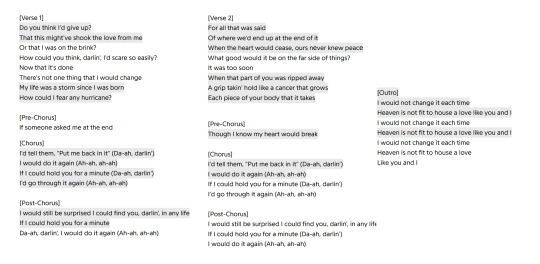
(cracks knuckles) this is the big one. the album francesca is from, unreal unearth, is based on dante alighieri's divine comedy, a fourteenth century poem about a man venturing into hell, purgatory and eventually heaven. the eponymous francesca is one francesca di rimini, a woman who was politically married off to a man older than her, called giovanni malatesta. francesca didn't love him, and eventually fell deep in love with giovanni's younger brother, paolo. the two carried on with the affair for years, before being murdered by giovanni upon his finding out. francesca and paolo are mentioned in canto v of the first book, inferno, as two souls damned in the second circle of hell, lust. their punishment is to be permanently locked in a hurricane, swept away by the winds the moment they manage to get close enough to touch one another.
as opposed to their portrayal in the poem, the song is from the perspective of paolo, explaining that no matter the punishment, he wouldn't change anything about his life because he got to know, and love, francesca.
the first verse brings to mind the scenes in hell, especially on the staircase ("do you think I'd give up? that this might've shook the love from me? or that I was on the brink? how could you think, darlin', i'd scare so easily?" as an echo of charles' "sorry. no version of this where i didn't come get you"). "my life was a storm since i was born, how could i fear any hurricane?" could relate to charles' tumultuous family life, an assurance that nothing he has to deal with while by edwin's side will faze him given the things he's lived through. no, despite everything he's suffered through, charles wouldn't do anything differently - because his (admittedly shitty) life led him to edwin ("i'd tell them, put me back in"). we already know charles would choose him over heaven, willingly sacrificing his own afterlife to stay with a boy he's known for hours, someone kind enough to keep him company as he drew his final breath. all of it - his father's abuse, his schoolmates' bigotry, the pain of his own death, as well as everything he's gone through since - he'd do it all again, for edwin.
"for all that was said of where we'd end up at the end of it" could be taken as an allusion to the fate the boys would meet at "at the end of it", when they're finally caught by death and separated, or as more of a general "if you sin, you will go to hell when you die" (up to you to decide what the sin itself would be - an interpretation that would work with other songs on the playlist is that one such sin would be same sex attraction). then their hearts ceased, they never knew "peace", nor did they want to find it in death. their deaths were too soon, them being ripped away from life, but even though it would break his heart: charles would ask to do it all again.
the outro, i think, beautifully pulls it all together: heaven is not fit to house a love like theirs.
to wrap it all up:
jayden, what were you cooking in there? what do you know??
#please interact w me please please please i need dbd moots <3#dbda#dead boy detectives#dead boy detective agency#paynland#payneland#painland#paineland#chedwin#charles rowland#edwin paine#edwin payne#dead boy detectives agency#dead boy detectives analysis#aough jayden your mind#my art#<- my umbrella trashcan tag
759 notes
·
View notes
Text
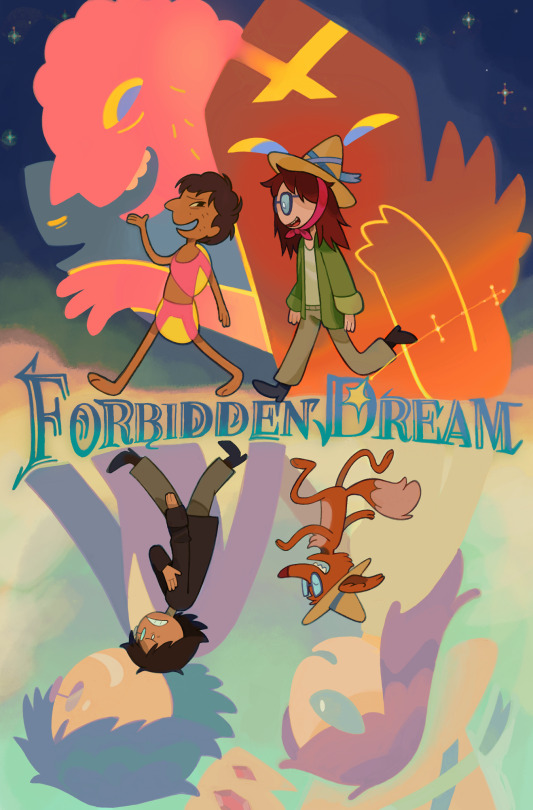
Forbidden Dream
This is all of my Adventure Time AU in chronological story order. Thanks to my friend for proof-read.
Act I: Prismo and Betty
This takes some time after the events of F&C. Prismo and Scrabby inhabit the TR(TimeRoom) and Golbetty has gotten restless with her time in space. She decides to reach out to other multiversal beings, but no one wants to associate with Golb. She finally finds someone that puts up with her ..that being the Wishmaster.
Prismo is scared of Golbetty at first, especially Scrabby since he has a little bit of history with her. He scurries off or hides behind Prismo when she is in the TR. To Scrabbys surprise, Pris and Betty hit it off and become good friends. They find they have something in common, which is their “human” past. Theyre both mortals turned to immortals.
The duo start off by drinking and making fanfics together, but then Betty proposes the idea of making these fics “real”. Prismo is hesitant at first but lately he doesn’t mind breaking the rules.
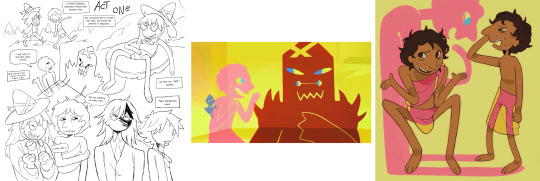
At first they visit universes that Prismo considers safe. They treat them like vacations, and a lot of these worlds do not have the typical AT characters. Theyre peaceful docile places. Prismo gets daring, telling Betty that he wants to feel alive again. The two of them agree to visit a dangerous world, the Vampire Kingdom.
Notes:
- Betty chose her physical form to look like magic Betty because she felt it would be strange to appear as she normally did in the past.
- Prismos physical form is what he looked like as a younger human. He thought it would be more fitting for the “adventure”. Also.. He hates how clothing feels on him, so the see-through garments suffice.
- Scrabby is not happy about their friendship. He feels that Prismo has gotten even lazier, foregoing his Wishmaster responsibilities and even worse, ignoring him. The scarab thought he found someone that was happy to spend time with him for the first time, But feels like he has gone back to being the “forgotten” one.
EP II: Vampire Kingdom
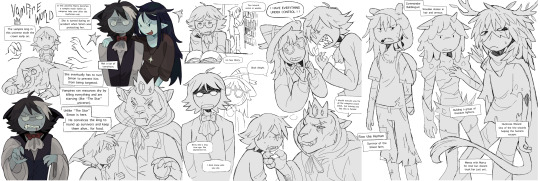
Once Pris and Betty teleport here, theyre immediately caught off guard by a group of vampires that whisk Prismo away and the two are separated. Betty gets surprised by a starved vampire!Simon, who at first doesnt recognize her until he gets a good look at her face.
He refuses to believe its actually Betty and rather a wizard attempting to play tricks on him. Marcy calls his name and he flys away, leaving Betty stunned.
The vampire world is an AU where Vampires take over, but Simon never died and was able to stay with Marcy. Marcy isnt evil here. Simons crown was stolen before he could make a complete transformation into IceKing, and his sanity was kept in part to Marcy turning him to save him from a group of hungry vampires. One curse was replaced with another.
Marcy was turned at a younger age by the VK, but Simon saved her by scratching at the VKs eye (his face scar). Even though the King is furious at Simon for this, he thinks it is more amusing to keep Simon alive and suffering from vampirism. Vampires are starved in this world just like “The Star” episode, but Simon proposes the idea to wrangle human (and animal) survivors and keep them on a reserve to supply the Vampires with a food source. He inevitably becomes the person in charge of the Blood farms. Keep in mind, Simon did this to save humans, otherwise they would have been hunted to extinction.
Unlike the safe worlds PrisBetty visited, this world has most of the original cast in them. Finn is a survivor of the Blood Farms, swearing to kill Simon who he believes imprisoned him in there (which.. is true). The farm is surrounded by booby traps all around the perimeter, no one can get in or out without some level of flying.
Finn always managed to get close to escaping But eventually gets caught in one of the traps. The last attempt caused him to cut his own arm off to be freed and helped by Huntress Wizard. She is one of the few wizards to help the freedom fighters, a band of humans and candy people led by Commander PB. Wizards are hated by Vampires since theyre the few beings that can overpower them. They try to stay out of each others business But huntress is an exception as she feels that the vampires are disrupting the balance of nature.
The Candy Kingdom is fortress walled with wooden spikes and garlic (I thought it would be silly Lol). PBs armor consists of wooden stakes and reminiscent of Golb who she is a follower of. She has access to the Enchiridion and sees Golb as a being that she should harness the power of if the vampires happen to overwhelm her people someday.
The end of the story would involve PrisBetty helping Simon overthrow the VK after Marcy discovers the vampires ability to “drink red” instead of blood. They team up with the help of PB and Huntress. Simon never truly reconciles with Betty as his defense mechanism is to push any feelings of his past away. But he does have a newfound respect for her and tells her to visit him again. Simon will assume the role of Vampire King and free the humans afterward.
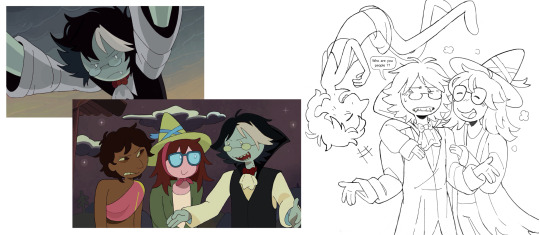
Notes:
- Simon is the only vampire dressing in traditionally “Dracula” clothes. Because hes a nerd and thinks its fitting.
- Marcy is raised by Simon here instead of VK, so she is a lot kinder and sympathetic to the humans and candy kingdom (even if she doesnt show it for a while).
EP III: Winter Kingdom
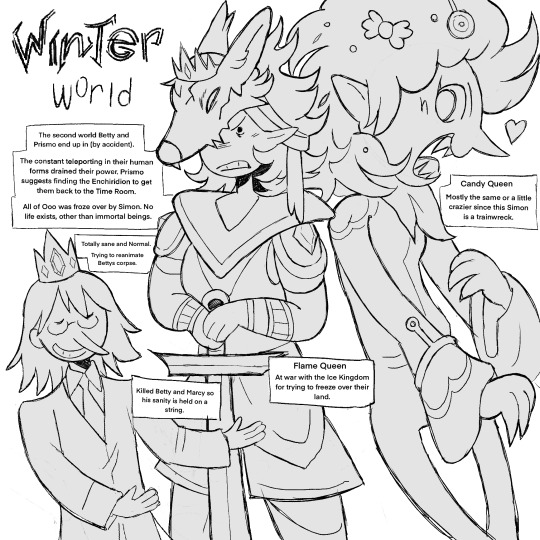
After the Vampire world, Prismo and Betty decide their adventuring is “complete” and attempt to teleport back to the Time Room with Prismos magic. This doesnt work out. Turns out, their human forms have been draining their magic slowly, making it so that they need to find a magical item to recharge. This being the Enchiridion.
This is a totally different world than (Canon) Winter Kings as obviously he is alive here.
Ooo has been mysteriously frozen over and put into an eternal Ice Age. There is hardly any life (apart from immortal beings and those resistant to the temperatures) so hardly anyone lives on the surface. Prismo automatically assumes WK is responsible, but Betty refuses to believe Simon would be the cause of this destruction. WK has a much larger kingdom with a variety of ice people, a lot of them more human-like in appearance. It seems like he is trying to mirror a human society.
Here WK has Bettys skeleton and attempting to use the cloning machine he has in F&C to clone a “real” Betty (which is why he doesnt have an ice clone of her).
The backstory of this WK mirrors my au version of him.
Prismo and Betty are briefly separated and I wont go into too much detail on the story. Betty gets the “safe” tour of the kingdom by WK and Prismo is left to wander in search for the Enchiridion. He starts to see things that point to a darker scene (fire people fighting ice soldiers, lack of any plant life, and ice clones of people who no longer exist). At the same time, Betty is off-put by WKs controlling nature. He reveals to her that he has been in a 100-year war with the Fire Kingdom “who destroy everything” with their flames, while ice “preserves it”. Betty is shocked to see the extent of destruction the Ice Kingdom has caused to Ooo and manages to slip away to do her own investigating. She eventually ends up in the room Bettys corpse is kept, which is the only place that WK allows plant life to grow. The Enchiridion was sitting on skeleton Bettys lap.
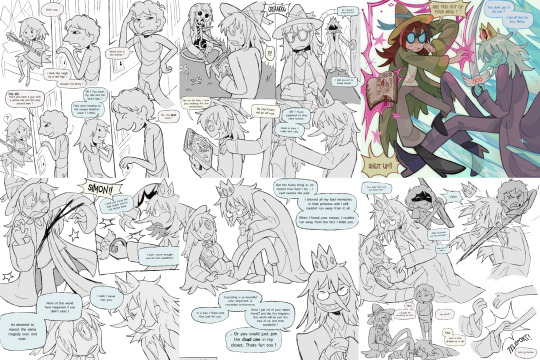
The two of them engage in a fight where he details his plan for her and Ooo.
Prismo manages to save her at the end of it. Up until this point hes been a pacifist in the story. They use the Enchiridion to teleport home and they end up.. not there.
Notes:
- I had a bonus page where Scrabby is reacting to PrisBetty not arriving back in the Time Room. He thinks they didnt teleport back on purpose.
- This page also has WK grabbing Bettys ankle right as she teleports. I was going to have WK teleport with them so there was some kind of threat. I am not sure yet.
- The fight scene was supposed to be a lot longer with Betty having the upperhand at first, But I didnt want to draw all of it.
- Winters appearance slowly turns back into Simon when separated from the magic crown.
EP IV: Back Home
They end up in Ooo where the magic teleported them into the sky, making them fall a great distance. They are a little injured, but Betty is mostly shaken by her experience in the Winter world. She redirects this into frustration at Prismo for not teleporting them to the correct place and that they would need to search another “sucky universe”.
Prismo is frustrated and goes off on his own to find another magical object. Betty stays put in the forest. When looking up, Prismo realizes the universe they teleported to was actually the main Ooo upon seeing the floating human city. He rushes back to where Betty was sitting, telling her to go find her Simon here in Ooo, that he knew that he had the Enchiridion in his closet. Betty refuses, knowing that she already said goodbye to Simon years ago and him seeing her again will only hurt him.
Prismo is annoyed at this but walks off, and Betty wanders around the forest until she encounters one of the transport boats that take people up to the city. In her reluctance, she hitches a ride. Meanwhile Prismo reaches a graveyard on the outskirts of the woods, he hides in the bushes and sees a familiar person, Finn, walking up and leaving a bouquet of flowers at the grave.
When Betty makes it up to the city, she explores for a bit before approaching Simon (who is signing a childs book). Before she could say anything, she covers her face with her hat and speeds off. He is at first confused by this but is immediately distracted by the kid again.

Betty is in shock and retreats onto the boat leading her back down to land. She eventually catches up to Prismo, who is kneeling over Jakes grave. She attempts to comfort him, but the words fall short. He asks her if she visited Simon, but Betty says she couldnt do it. At this point Prismo feels like he wasted his time in the Time Room when he could have been spending it in his human form visiting Jake. He remained trapped in the TR unable to spend time with the mortals he built connections with. He feels that Betty is going to suffer the same regret he feels after Simon inevitably dies.
In a turn of events, Prismo places his hand on the grave and it teleports them back into the Time Room. They are amazed by this, Jakes grave acted like a magical object would have. They temporarily celebrate before Betty is impaled by an angry Scrabby.
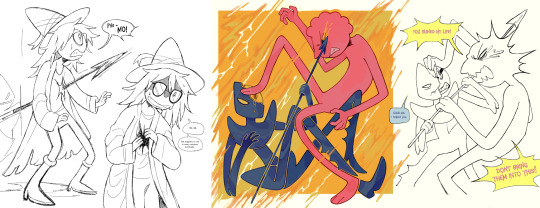
Bettys human form is heavily injured as Prismo and the Scarab fight in several rooms. Scrabby tells him that he alerted the auditors about their misdeeds. That they will both be locked away for thousands of years or perhaps forever just like he was trapped in the Time Room.
Prismo temporarily subdues Scrabby and goes back to the main room where Betty is. This is where he turns her into a fox to keep her hidden, and promises that her memories are all stored in her body dormant in Golb (Like how Prismos form is dormant in the Time Room).
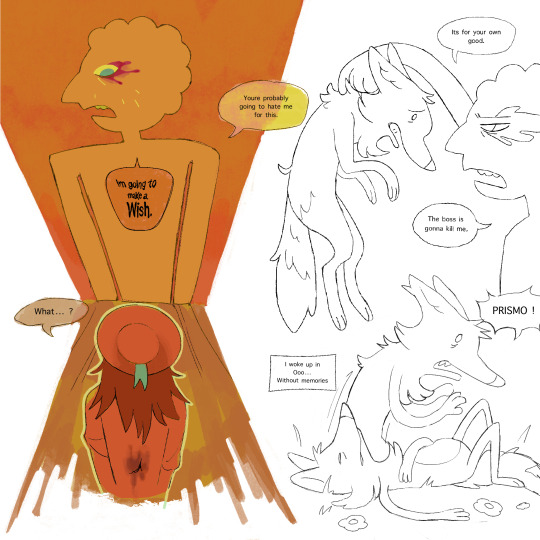
Fox!Betty wakes up in Ooo, no memories, a feeling of disconnect from her body, and hungry.
End of Act 1
Act II is all about Bettys life as a fox in Ooo. Its a lot calmer and slow burn in comparison to Act I. Upon landing in Ooo, fox!Betty encounters posters advertising Simons* sci-fi series Casper and Nova. She is convinced he is knowledgeable about space because a talking dog told her he was.
*EDIT: Someone pointed out that C&N was written by Astrid (it is implied heavily). Pretend the posters are the two of them working together, maybe Simon helping Astrid write them since she is just a kid.
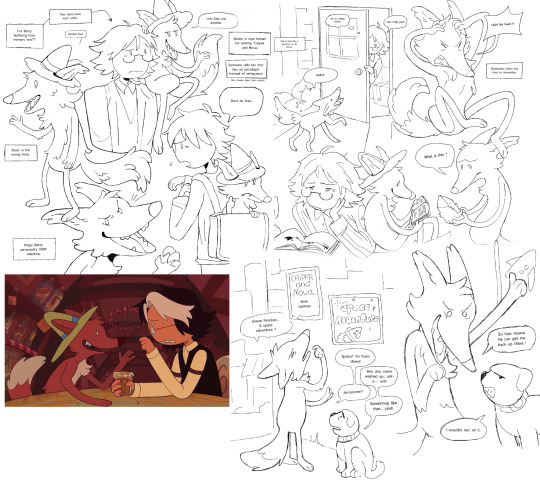
She starts pestering Simon at one of his book signings and he already dislikes foxes because earlier in the week, a band of them stole his draft for an upcoming book. Betty proposes that she will find the notes and return them to him if she can have a place to stay (Even though he says no, she crashes at his place anyway).
I thought about Simon giving Betty a nickname so that she isnt just referred to as “fox”, so she is “Sunny” since she really likes when he makes sunny-side up eggs. She really likes eggs as a fox that is her quirk.
Update 1/21/24: Sunny encounters Simon after breaking into his home and snooping around for clues. Simon ambushes her in the Golb ritual room, assuming she has come to steal the Enchiridion. Sunny explains herself and claims that she can get Simons draft back from the fox thieves. They go on an “adventure”. It is revealed that fox!Betty can transform into Betty only when unconscious/sleeping. Simon wakes up next to her but assumes he is hallucinating..
Post about Simon and fox!Bettys dynamic.
I couldnt fit all images into this post as there is a 10 photo limit. I decided to link additional photos to underlined text. If you want further context, check those out. I love reading others AUs and was inspired to do my own. Any questions can be left in comment. Thanks for read..!
#Forbidden Dream AU#Edit: 1/21/24#adventure time#fionna and cake#betty grof#prismo#simon petrikov#au#headcanon#fanart#guide post#vampire simon#winter king#prismo the wishmaster#the scarab#petrigrof#golbetty#golb#princess bubblegum#marceline the vampire queen
1K notes
·
View notes
Text
small talk
gojo satoru x fem!reader
summary: satoru has never learned the definition of "small talk" and you don't care to teach him
a/n: i was requested to hold off on the angst, so i decided to comply (very gracious, i know) so take a flashback fic, in which our characters lack all of their trauma (also I'm working on the next actual part and it... might take a bit)
last part | next part

second year, month two.
“c’mon, nanami, you owe us," you're saying, laying across the couch in nanami's room, feet sore from walking around all day.
it's only noon, and you already feel like you've suffered through several weeks of this. your only two classmates siding with each other almost always.
except for now, because you're pouting. trying to convince kento that being a recluse will get him nowhere in life--you would know.
“no, i do not.”
you roll your eyes. “sorry? who sliced the curse in two before we even got the chance to look?" you ask, rhetorically. "oh, you? that’s right.”
nanami shakes his head, but you see his lips twitch—about to give (another) involuntary apology. if you keep up the whining, he'll probably give you his firstborn.
“it could be fun,” haibara adds, chewing on some weird candy he picked up at the convince store by your mission. it smells like a rotted corpse, which is what you told him when he offered to share.
“i seriously doubt that.”
“well, i seriously don’t care,” you tell him, “this is the first time we’ve been invited. unless you want to spend the next two years getting wedgies—“
“gojo can’t even touch me,” he argues, arms crossed. his eyes are unyielding as he stares at you. “and geto is more respectable than that.”
haibara laughs, probably at the mention of a wedgie.
“well, i wouldn’t know. but i’ll find out tonight when we all go with them to… wherever they’re going.”
because you showed up a couple of weeks after the two of them, much to your dismay, you haven't become acquainted with your seniors or any of their quirks. it's honestly unfair. but neither of them seems to care about their upper hand or the fact that you're tired of being stuck around them all of the time.
“i have plans.”
“no you don’t,” you snort. “we’re your only friends.”
“that’s not relev—“
haibara hangs on nanami’s shoulder, smiling at him with his puppy dog eyes. “kento, we have to go. i want to ask geto a couple of questions, and y/n’s already annoyed.”
you huff, crossing your arms. you have a good reason to be upset.
nanami looks at you, then sighs. “i already told you, it was a grade four, it didn’t even look ‘cool’ like the one you and haibara exorcised last week.”
“i’m not talking to you.”
haibara laughs, going to sit down next to you, ruffling your hair. it’s irritating, how nonchalant he is about this. like nanami didn’t steal your mission right in front of you.
and kind of adorable. you lean into him, resting the side of your body against his arm. maybe his energy will mix with yours.
“y/n, i already apologized.”
you turn your head away from him.
“this is very immature.” he gives haibara a pleading look.
you can feel it as he laughs against you.
nanami sighs. “fine. this once. if you ever ask again—“
you jump up, moving beside him to squeeze him into a makeshift hug (which he doesn’t return). “i knew you’d come around,” you say. because you did. nanami is notoriously easy to break, despite his untouchable demeanor.
nanami sighs again. more forlorn. “this is going to be a disaster.”
and obviously, haibara takes this opportunity to move to his other side, participating in the group hug.
*
in all honesty, you’d expected more.
it’s not that you idolize your upperclassmen—if they can even be classified as such—but seriously, after a year they haven’t come up with anything more entertaining than dragging someone’s tv into the common room and playing mario cart?
you figured there'd be more excitement here. a lot more break-ins, and more chances for heroics.
but, you remind yourself, trying to sit pleasantly, this is the first time any of you have been invited. the first time you've spent with geto, Gojo, and shoko without yaga hanging over your break, threatening all of them to be nice. you just want a chance not to be the only new one around. the least educated, weakest.
so you might as well try and enjoy it while you can.
besides nanami and haibara, you don’t have a lot of friends. you didn’t, even before you started at jujutsu high. you barely even had a family.
so you’ll take what you can get (even if it's three people who speak in code and seem to do nothing but fight).
“oh, how’d that mission you guys went on go?” geto asks after he’s beaten haibara at a fourth race. “where was it?”
“harajuku,” nanami says, sounding more like he’s telling you his grandma just died.
“get anything cool?” gojo asks, leaning his head back against the couch so he can look at you upside down. his sunglasses are sliding off of his nose, and you blink.
“we left pretty quickly,” haibara answers, for all of you. “it was just a grade four.”
“they sent all of you for that?” shoko, who is pretending to read some sort of biology book right in front of the tv, raises her brow at you.
at least there’s some common ground there. being the only two girls in a fifty-foot radius creates its own sort of bond.
you’re about to remark something snarky about nanami and his control issues, but haibara is eager to please, so he says to her, “nah, it was supposed to be harder. grade two, they said.”
“been there,” she answers.
geto raises a brow, but his eyes don't move from the screen. “no you haven’t?”
“listening to gojo’s story about that ‘grade one’ he ‘exorcized’ is basically like being there.”
“hey, that was true!”
the two of them give the boy a look, then resume their activities. nanami taking haibara’s place—not without some convincing—and the rest of you watching.
wow, what a life for jujutsu sorcerers.
you laugh at the thought and ignore the weird look shoko gives you.
eventually, gojo makes his way from across the room, his chin resting on geto's temple, and sits on the floor next to you, long limbs getting in the way.
you barely glance at him with your brows raised, then look back to the screen. nanami is surprisingly good at it. and you find gojo kind of... bizarre. he's always laughing, always leaning against something, and just his presence right next to yours feels like an intrusion.
“so,” gojo whispers to you, schemingly. “gabumons better than agumon, right?”
you turn to him, tilting your head. “what?”
“kind of an unpopular sentiment,” he adds, “but true. i mean, c’mon, metalgarurumon? freezing breath? so cool,” he says, like you’re supposed to know what it means. he's got that same grin on--the one you've watched from across the courtyard, shaking his hand, and probably even that time you caught him napping on the dining table.
“…what?”
“satoru, leave her alone,” geto says because this must be a regular occurrence.
“i’m just making small talk!”
shoko snorts. “i don’t think you’ve ever talked small a day in your life.”
gojo opens his mouth but apparently has nothing to say about that.
he sighs, leaning his chin on a hand, and watching the screen again. clearly, his classmates have ruined all of his fun. how is he supposed to mess with you in peace with them around?
when he catches you staring at him a moment later—mostly bewildered because you’ve heard many rumors about satoru gojo, and none of them involve him being a grumbler—he grins. “your turn.”
“to what?” you say, hoping he doesn’t mean the game.
he leans toward you. “to make small talk.”
“i don’t think your turns over.”
“you’re supposed to continue the conversation. answer my question…” he hints.
“you didn’t ask a question,” you say, “just made a statement about what’s-your-mon and who’s-your-mon.”
he looks around, outraged, like you’ve said something completely insane.
you cut in before he can add anything, “and you know that small talk is supposed to be about, like, the weather, right?”
“the weather? you’d rather talk about that than cyborg digimon?”
“…i think so?”
“ignore him,” shoko calls.
but you can’t. there's something about him that gets under your skin. and, it's satoru gojo, he's intriguing in his own, annoying way.
“fine. how do you like the weather?” he asks, tapping his fingers against his chin, smiling at you again.
you pinch your lips together. “it’s fine. rainy.”
he throws his head back, groaning. “see? this is boring. and so is this game, because suguru just beats everyone.”
“i think nanami won the last round.”
he gives you a ‘really?’ look, and you shrug.
“do you guys do this a lot?”
“do what?”
you gesture towards the tv. “sit around and do nothing.”
gojo scoffs. “this is very important, you know. we take video games very seriously.”
you take a look at geto—who’s sticking his tongue out while he handles the controller—and haibara, who’s pointing at nanami’s face and laughing.
you must’ve missed something. not that you've been paying much attention to the game, anyway.
you've been mostly obsessing over your expressions, trying not to say anything out of place, and figure out how to speak to any of these people without sounding foolish.
which, so far, hasn't gone well.
“what do you guys do, then?" gojo asks, sarcastically. "meditation circle?”
you snort. “study, usually. or hand-to-hand combat. haibara and i need the practice.”
“shoko won’t spar with me and suguru can’t anymore after we accidentally put a hole in the gym wall last time.”
“that was you? how do you accidentally break through concrete?”
he shrugs, winking at you. “suguru’s flying frog things are heavy.”
“flying frogs?” you say, skeptically.
“oh, child,” satoru pats you on the head. “you’ve got lots to learn.”
“apparently,” you say, and turn back to the tv, and the debate the four of them are having about character types or something.
but gojo doesn’t move from his spot. he sits next to you for the next hour, and you learn, for the first time, just how insufferable he is.
especially with his smile, which you find yourself staring at every couple of minutes.
*
next part | series masterlist
#gojo satoru#gojo satoru x reader#jjk gojo#gojo x reader#jujutsu gojo#a typical family#jjk fanfic#jujutsu kaisen x reader#jujutsu kaisen#gojo satoru x you#gojo satoru x y/n#gojo satoru fluff#gojo x you#gojo x y/n#gojo saturo#satoru gojo x reader#satoru gojo x you#satoru gojo x y/n#satoru gojo fluff#jjk x reader#gojou satoru x reader#gojo fluff#satorugojo#jjk satoru#jujutsu satoru#jjk#jjk fluff#jujutsu kaisen satoru#gojo jjk#jujustsu kaisen x reader
617 notes
·
View notes
Text
Disability Tropes: The disabling change of heart

When a character in a story becomes disabled, they'll sometimes experience a trope that I like to call "the disabling change of heart". This is when the character goes through a massive change in their outlook, their personality, their goals or even roll in the story, specifically because they became (or are about to become) physically disabled. Sometimes, this will be in relatively small ways: the happy-go-lucky comedic relief character might become bitter, angry and jaded after getting into an accident that caused a spinal injury, or the severally depressed and nihilistic character might suddenly start acting more cheerful and hopeful, stating that loosing their leg has "put things into perspective and showed them what really matters". In other cases though, the impact is much larger, the heroic character you've been hearing about looses an arm thanks to the main character's actions, causing them to become consumed with anger and self-loathing which they take out on everyone else, eventually becoming an antagonist as they seek revenge for what the main character did to them. The morally grey or even villainous character is injured by their own scheme, giving themselves a permanent disability in the process, which prompts a change of heart and leads them to turn their lives around and become better people, maybe even deciding to team up with the heroes.
Now, having a character go through a personality and goal change due to a major life event, such as becoming physically disabled, isn't inherently bad. A lot of writers are told to tie major shifts in your character's development to major life events, because realistically, something like becoming newly disabled will at least impact how you view the world around you. I very frequently talk about how if I didn't loose my legs, I would have become a vastly different person, but the issues with this trope depends on how it's used and the reasons behind these developments, and whether or not the change suits the character in question.
Before we get into things, I would like to specify that in this post, I'm only going to be talking about how this trope is used with physical disabilities and other easily visible forms of disability. It does show up with characters who develop disabilities under the mentally ill and neurodivergent umbrellas, and is actually a bit more common than what I'm talking about today, but the specific ways its utilised are so different that it's more or less a separate trope, and one that deserves much more attention than I could give it here as this is already going to be a pretty long post. So for today, I'm keeping to it's use with physical and visible disabilities, and we'll talk about how this trope is used with neurodivergence and mental illness another day.
The main thing you need to be mindful of is ensuring that you, as an author, are not including your ingrained biases about disability into the reasoning behind the change. Let's look at one of the examples from before, an evil character who, after loosing their arm (because it's almost always loosing an arm for some reason) becomes a villain and wants revenge against the main character. In a story like this example, the character who became an amputee often views this new disability as something that has ruined their life. It's something that has caused them to suffer, and they want to make the main character (or whoever has "wronged" them) suffer like they did. Stories like this example portray disability as something that is not just horrible, but life-destroying, especially with villains who become all-consumed by the misery this disability has brought them. Many stories that utilise this version of the trope also often perpetuate the idea that if you become disabled, you'll have to give up all the things you love and your goals, even when this wouldn't necessarily be true for the character in question.
Let's say your character was a knight, and the main character cut off their arm in a training accident. obviously you can't be a knight with only one arm because you can't fight anymore, so they left their order. Now this character has become a villain and has found power that "makes up" for their disability, perhaps magic or some other force that doesn't exist in the real world, and are back to get revenge on the character for ruining their lives. Here's the thing though, the loss of a limb, or at least, the loss of an arm specifically, often isn't the career ender people think it is, even back then. In fact, there are many historical records of real amputees continuing to serve as knights and other similar military roles after loosing an arm or at the very least, continuing to fight in other ways. One such example was Götz of the Iron Hand, a mercenary knight who lost his arm to a cannon. Götz had fought as part of the Roman empire's military in 1498, but shortly after left to form his own mercenary company. He lost his hand in 1504 and continued his career as a mercenary with the help of an iron prosthetic capable of holding his sword and the reigns of his horse, among many other things such as writing, for another 40 years. Götz wasn't unique in this though, several suits of armour from the same time period have been found with integrated prosthetic hands, though the names of their owners are unknown. There was also Oruç Reis (aka Aruj Barbarossa), A privateer admiral who served the Ottoman Empire in and around the Mediterranean who lost his left hand - earning him one of many nicknames: Silver-Hand, thanks to the colour of his prosthetic. Oruç, like Götz, continued his career for several more years until he was eventually killed in 1518.
My point in bringing this up, is to highlight how important it is to double check that the reason your character's whole motivation for turning to villainy, isn't just based on your ideas about what a disabled person can or can not do. Actually double check it, research it, especially if it's important for your plot.
Even in the cases where the disability in question actually would stop someone from being able to do something, the incorrect assumptions can still occur and cause issues in different ways. For example, a character in a more modern setting who looses their arm due to an accident the main character was responsible for while serving in the military would be discharged, ruining the character's plan to become a general some day. This absolutely would be devastating for a character like that, and they realistically could struggle to adjust, both in terms of getting used to their disability and finding new goals for their life. They may well feel anger at the main character, however, if you are portraying just living with a disability, in the case of this example, living with an amputation as inherently "suffering" for no other reason than they are disabled, it is still perpetuating those really negative ideas about disability. I've said this a few times in other posts, but villains who are evil or even just antagonists purely because they're disabled or are trying to avoid becoming disabled is a trope all its own and one that is best avoided if you yourself aren't disabled, as even outside of spreading these negative ideas about life with a disability, it's just an overdone and overused trope.
But what about when this trope goes in the other direction? when you have an antagonistic or even just morally grey character who becomes disabled and this is the catalyst that turns them into a good guy?
For the longest time, I knew I usually disliked this version of the trope too, but I couldn't put my finger on why. With disability being the reason someone became a villain, the underlying reason it's there is often able to be boiled down to "I, the writer, think being disabled would be terrible and life like that is inherently suffering, so this character is angry about it," which is obviously an issue (the "inherently suffering" bit, not the anger). However, when a character becomes good due to becoming disabled, the reasoning is usually more along the lines of, "this is a big change in a character's life that has caused them to reconsider and revaluate things" (or at least, that's what I thought). This isn't bad, nor is it necessarily unrealistic. Hell, as I already said, I do consider my disability to be a catalyst that made me into who I am today. I also know plenty of people who, after becoming disabled later in life, did have a big change in how they viewed themselves and the world, and who consider themselves better people since becoming disabled. It's far, far from a universal experience, mind you, but it does happen. So why did this version of the trope still not sit right with me?
Well, I think there's a few reasons for it. The first being that there's a tendency for non-disabled people to think real disabled people are just incapable of evil deeds, both in the sense that they aren't physically capable of doing them (which is bad and not even always true for the reasons we already discussed), but also in the sense that there's this idea that disabled people are, for some reason, inherently more "good" and "innocent" - As if breaking your back or loosing a limb causes all evil and impure thoughts to be purged from the body. This is a result of many folks viewing disabled people as child-like, and thus attributing child-like traits (such as innocence) to them, even subconsciously. This is an incredibly common issue and something disability rights organisations are constantly pushing back against, as this mentality can cause a lot of unnecessary barriers for us. With how often I and many other disabled people are subjected to infantilization, I would be honestly shocked if it wasn't at least partially responsible for people thinking becoming disabled is a good reason to kick off a redemption arc.
This infantilization isn't unique to physically disabled people by the way, in fact it's way, way, more commonly directed at people with intellectual and developmental disabilities - or at least, people are more open about it, but as I already mentioned, how that is reflected in tropes like The Disabling Change of Heart is vastly different and deserves a post of it's own.
That's mostly just speculation on my part though, since that infantilising mindset does show up a lot in media, but not usually as part of this trope specifically.
However, it's not the only reason I wasn't a fan of it. When the disabling change of heart is used to fuel redemption arcs, I think, once again, that the disability itself being credited with causing the change directly is another factor. When this happens, it's usually because "it put things into perspective for me and showed me what really mattered."
This sounds better than our previous example on the surface, but stories that use this logic are often still portraying disability as an inherently bad and tragic thing, something so bad, in fact, that it makes all the other (legitimate) issues they thought were massive before seem so small by comparison. This is a type of inspiration porn: content made to make non-disabled people feel inspired or just better about their own situation. It's the mentality of "well my life is bad, but it could be worse, at least I'm not disabled like that!"
In a fictional story, this might look like an athlete character who dreamed of making it big so they could be famous and get out of poverty. They were a dick to anyone who got in their way but only because they were worried about not being able to make rent if they don't constantly win. One day though, they overworked themselves and got into a car accident on the way home because they were too tired, and now they're in a wheelchair and can no longer walk, which is (supposedly) absolutely tragic and way worse than anything else they were already going through. But they end up becoming a better person because it has put things into perspective for them. Yeah they were struggling to make ends meet, but at least they weren't disabled! Now that they are, they know they shouldn't have cared so much, because money doesn't matter when compared to not being able to walk, right?
As well as portraying disability in a negative light, these kinds of stories dismiss and diminish the other struggles or challenges the character is experiencing, placing the status of "not disabled" above all else.
There's also the fact that, when a lot of real people say their disabilities had positive impacts on their lives, they don't usually mean the disability itself is directly responsible for the change. There's exceptions of course but for myself personally, and most of the people I know who say they are better people because of/since becoming disabled, the disability has been more of a neutral catalyst than the actual cause of positive change. Meaning, it opened the door to allow those changes to happen, but it wasn't the direct cause. For me personally, becoming physically disabled at a young age didn't make me a nice person like people expect, I was still a little judgemental asshole for a lot of my childhood. However, because I was disabled, I had to travel a lot, initially because I needed medical treatment that my local hospital wasn't equip to provide, and later, because I started competing in disability sports. because of both of those things, I met people I never would have otherwise who made me reconsider what I'd been taught on a wide range of subjects, and made me question where those beliefs had come from in the first place. When I say my disability played a part in who I became, it wasn't because my disability itself change me, but it helped me meet people who were positive influences on me and my life. but when creatives make characters who experience arcs like this, they ignore this, again, defaulting to the "this was a bad thing that just put all my other problems into perspective" reasoning.
Some iterations of this trope also use disability as a kind of "karmic punishment" where the disability is portrayed as a rightfully deserved punishment for an evil character's deeds - usually something relating to the disability they acquired but not always. An example might look like an evil tyrant who punishes the rebels they captured by cutting off their hands. Eventually, this catches up with him, maybe the friend or a child of one of the rebels is able to capture the tyrant and cuts his hands off as payback so that he gets a taste of his own medicine, a taste of the suffering he imposed on others. Now facing at least one of the same realities of the people he subjugated, he realises the error of his ways. With some pressure from the main characters, he has a change of heart and surrenders himself, steps down to let someone else take his place, or perhaps he decides to start changing policies to be more in-line with these new morals until some other character usurps him, becoming an even bigger threat than the previous former tyrant.
Once again, stories that use a disability like this are still portraying the disability as an overall inherently bad thing, but there's the added layer at play in this example. The thing is, there are a lot of people in real-life who actually believe disability is a punishment from God. I remember one time when I was over in the US, an older lady came and sat down on the seat beside me on the bus and started asking me about my disability and specifically, how I became disabled. This isn't an unusual interaction, it happens fairly regularly whenever I use public transport, but on this particular day, the conversation suddenly shifted when I told her I became disabled when I was very young. This woman, despite the bus-driver's best efforts to get her to stop, ended up lecturing me for an hour and a half (during which time I couldn't move due to how my wheelchair was held in place) about how my disability was punishment from God for my parent's sins. She then tried to convince me to attend her church, claiming they would be able to heal me. And the thing is, this isn't an uncommon experience.
A lot of disabled people are targeted by cults using this same method: they'll convince people their disabilities are a punishment, make them believe they deserved it, that they just weren't good enough, but don't worry, if you repent and come to our specific church we can heal you. There was even a case in Australia recently that uncovered a cult called Universal Medicine, who taught that disabled people were reincarnations of evil people, and that being disabled in this life was their punishment, as well as that parents who have disabled children were being punished for other sinful behaviours. They were found to be operating a disability care service named Fabic that was being paid for by the NDIS, a subsection of the Australian government funded healthcare system that specifically aids disabled Australians by paying for and subsidising treatments, technologies (such as mobility aids) and other services relating to their disability. Fabic was found to be stealing excessive amounts of funding from their disabled clients under the guise of therapies and carer services, but was not actually helping their clients at all. Whether it's just taking advantage of them to get their money, or actually using this logic as a justification to mistreat them, this mentality of "disability is a punishment" actually gets real disabled people hurt or worse, and so seeing it come up in media, even if there is no ill-intent, can be very distressing and uncomfortable for disabled audiences.
So with all this being said, is the disabling change of heart a trope you should avoid in all it's forms and versions? No, but it does need to be handled with extreme care. I do think it should be avoided as a reason for a character becoming evil for the most part. If that really can't be avoided in your story though, at the very least, ensure that you foreshadow the change. Your happy little ray of sunshine, embodiment of sweetness and innocence type character probably isn't going to turn murderous and want revenge for an accident for example. A character who is likely to be driven to that kind of extreme of wanting revenge for their disability, so much so that they become a villain, probably already had at least a few traits that would predispose them to that line of thinking already, before becoming disabled. As for when it goes in the other direction, and you have a character becoming a good guy, avoid using the reasoning that "the disability put things into perspective for me". Instead, if you must use this version of the trope, use the character's new disability as the reason they encountered other people and situations that challenged their views, things they wouldn't have encountered otherwise. No matter the reason though, be very careful to avoid inspiration porn, and as always, try to find a sensitivity reader to give your story a once-over, just to make sure something didn't slip under your radar.
[Thumbnail ID: An illustrated image showing the same elf character twice. The picture of her on the left shows her laughing evilly, two tiny horns protruding through her brown hair. She is wearing a black dress and red shoes. On the right shows her in a yellow dress, sitting in a bright pink wheelchair with her head held eye and her eyes closed. The horns have been replaced with a glowing halo. In the centre is text that reads: "Disability Tropes: The disabling change of heart." /End ID]
#Writing disability with Cy Cyborg#Disability 101#Long Post#Disability#Disabled#Disability Representation#Writing Disability#Writing#Writeblr#Authors#Creators#Writing Advice#Disabled Characters#Disability History#Language#On Writing#Disability in Media#Tropes#Disability Tropes#The Disabling change of heart
574 notes
·
View notes
Text
I find the general idea of Stolitz being “toxic” to be fucking hilarious. It’s thrown around so easily like it should be accepted that they fit this definition and….they really, really don’t lol. Like they have a pretty chill and common miscommunication and personal issues interfering with wants and desires conflict. Like I cannot stress how fucking chill it is. They don’t actively hurt one another intentionally, neither are trying to murder the other directly or indirectly, they are not on opposing sides of a larger external conflict save for inherent world class dynamics, they don’t manipulate each other or work against each other, etc. They say hurtful things and argue and are oblivious to the other’s issues but like, in a fairly normal neurodivergence and historical trauma driven way.
They do begin with a mutually agreed upon transactional sexual dynamic, which is often the crux of these “Stolitz is soooo toxic” arguments to the point the really intense anti’s cry SA. A transactional sexual dynamic Blitz was so okay with when it is no longer agreeable to the other party, and they communicate that and change the parameters in a way that gives him full autonomy, he spends half an episode trying to return to that dynamic. Much trauma. Very coerced. 🙄
There is a power imbalance but it only exists in the sense that one person is societally more powerful by nature of his birth and ignorant to it by nature of his upbringing. Stolas does not force Blitz into said transactional sex dynamic by exerting his power or influence so it’s largely irrelevant save for how it impacts Blitz’s personal self worth issues and it is never from a place of malicious intent. Which is what matters in media? Character intent and decisions are literally the crux of the narrative?? Stolas figures out it’s a problem for the type of relationship he really wants to have and corrects it and even goes above and beyond to ensure that Blitz will suffer no fall out from his choice if he decides to not pursue their romantic relationship further. Like, toxic WHOMST? Just, don’t talk to me about toxic until they get hot and bothered about how well the other tried to actively murder them. We have had zero poisonings or major betrayals in this ship and ya’ll throwing around toxic like words have no meaning.
“But he called Blitz his impish little plaything! He thinks of Blitz as a toy! As a sub-species!” Or maybe, just maaaaybe the sexually inexperienced character who is making shit up as he goes along based on his canonically identified incorrect perceptions of what the other wants/likes as well as ignorance of his own power and position thought he was just being sexy and cute? Just maybe? Like can we apply a smidgeon of deductive reasoning based on the sum rather than the parts? As a treat.
It just speaks to what I have observed as probable immaturity/lack of life experience driving a lot of the criticism or straight up vitriol regarding the show’s major conflicts. A very black and white application of moral purity that deems anything not rainbows and sunshine as toxic and where the ultimate goal is some nebulous and frankly hella ableist concept of “healthy”.
A similar thing plays out with regards to Octavia and the classification of Stolas as a “bad parent” because he is pursuing a relationship and has issues of his own to deal with on top of parenting. Heaven forbid a closeted gay man raised in isolation going through some late in life awakenings is not perfectly navigating an ill defined relationship and a divorce and raising a child on top of his myriad of mental health issues. What gets me the most is she’s not even a young child, she’s 17 possibly even 18 at this point in the timeline but the way people act he abandoned an infant at a flophouse to get his rocks off with someone who fears he will smite them down with his incredible Goetian might and if they refuse they’ll be living out of a gutter eating dirt because they wouldn’t perform sexually for him. Instead of the in-universe reality where the most egregious thing Stolas has done is fail to consider his daughters perspective and how this impacts her, made some inappropriate sexual comments really early on in front of her when he was still excited, and forgot, during a major life upheaval, a promise to watch a meteor shower he made to her like a decade ago. He didn’t even forget the promise itself, he just forgot what day it was. Like I forget shit I promised my kids last week much less when they were like 5.
Like there is such a huge disconnect between actual toxic behavior portrayals in media with regards to relationships and parenting, or hell toxic relationships and parents in real life, and what is going on in Helluva Boss. This is ignoring the fact that the actual universe of the show, which is what should be the metric when examining character dynamics not reality, has established real toxicity in both relationships and behavior, and has shown us time and time again how that toxicity contrasts with our characters and their relationships, be it Stolitz or Fizzmodeous or Moxxie/Millie or the parenting dynamics of Blitz & Loona and Stolas & Octavia. We have examples of toxic relationships, and we have examples of toxic parents in this world and we’ve been shown that the relationships of the main characters is in opposition to them.
But even if you were to take the, imo incorrect, position of applying real world considerations to fictional worlds it still doesn’t track as toxic.
Do you realize how many sexual transactions and power imbalances occur in relationships everyday as just a matter of course?
Like “I’ll wear that outfit you like if you do this for me?” Normal, Transactional. Accepted straight couple in a sitcom premise. I would wager “I’ll preform this sex act if you do X” is said in one way or another without anyone batting an eye a hundred times a day. And that’s ignoring the implication that transactional sex is inherently problematic. It isn’t, it’s the coercive aspect that is an issue and even then we get real handwavey about it in reality when the situation isn’t explicitly coercive.
“I’m a police officer/government agent/politician/media influencer/sole household income earner that has the ability to fuck up your entire life/reputation/financial stability just by nature of my job and how well we are getting along” is perfectly fine and normal. No one would suggest that a police office or government agent can only be involved with someone of equal systemic or social power in reality. Do my partner and I have a toxic power imbalance because I am the sole working person in our household and they are a stay at home parent and I hold all the financial power? No, that’s fucking silly.
Not to be all “sweet summer children I grew up in the trenches of toxic” about it but it’s the most baffling part of this fandom that a pretty low key conflict and relationship dynamic, where neither party is actively trying to hurt the other and has approached the entire thing from a place of earnest confusion and ignorance and is working through it in a pretty normal way is classified as “toxic”. Get back to me when they are poisoning each other, have killed several of each other’s loved ones and there is necromancy involved.
262 notes
·
View notes
Text
I saw this really great thread on twitter by Grungygrim and it definitely highlights my thoughts and frustrations with the story of these games and the Splatoon fandom as a whole. (be forewarned, i get really tilted in this blog post fyi.)
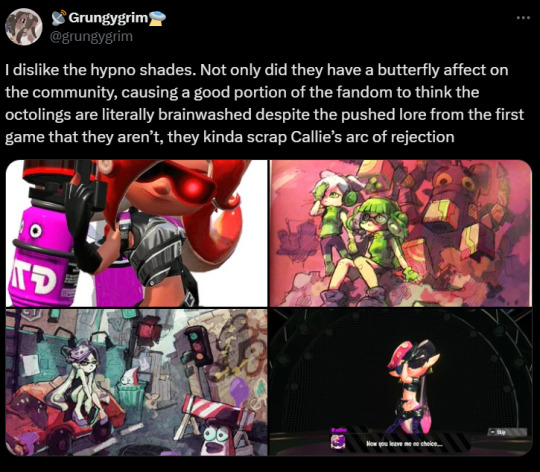
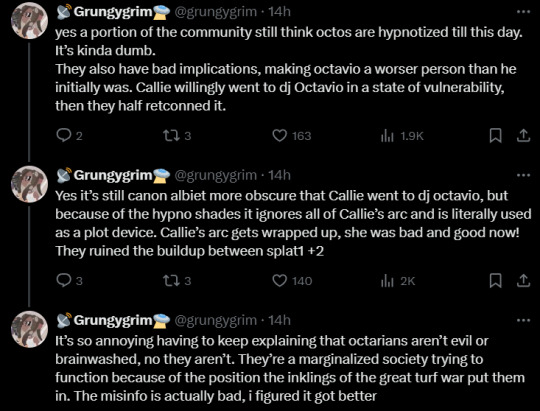
I made a blog post about 2 weeks ago where i said that i was happy that the narrative online that "Callie is an idiot who got kidnapped and then brainwashed/mind controlled against her consent" is going away. (Here's the link: https://www.tumblr.com/dr-spectre/749710338672525312/im-so-happy-that-the-narrative-online-that?source=share)
Unfortunately I'm gonna have to retract a lot of the stuff i said. I'm still seeing, TILL THIS DAY THAT NARRATIVE ONLINE! IM STILL SEEING SO MUCH MISINFORMATION AND IT MAKES ME REALLYYYY ANGRYYYY!!! As a big fan of Callie, people completely outright ignoring her character arc THAT WAS SET UP SINCE SPLATOON 1 BY THE WAY!!! and not even bothering to look at outside sources for more information and lore genuinely pisses me the fuck off to no end.
No, hypnosis is NOT MIND CONTROL/BRAINWASHING! I DONT WANNA KEEP REPEATING IT! YOU CAN LOOK IT UP! if a person is genuinely uncomfortable and doesn't wish to take the suggestions to heart while hypnotized, THEY WONT DO SO! THEY STILL HAVE CONTROL! Yes, Marie did say "kidnapped" in some of her dialogue, but from her perspective, OF COURSE SHE'S GONNA THINK CALLIE GOT KIDNAPPED! She's known to worry about Callie all the time and ruminate about her, of course she's gonna think of the worst case scenario, doesn't mean she's right though. Was Octavio still in the wrong for hypnotizing Callie in the first place and allowing her to bring out her darker traits more easily? YEAH! NO SHIT! HE'S A BAD DUDE! Not a totally evil person but he has made some awful decisions out of desperation for his people. Why do you think he was so quick to help out the New Squidbeak Splatoon in the finale of Splatoon 3? His people got turned into fluffy monsters by a giant bear, he's all about helping his people.


Hell look at how Callie acts while under the Hypnoshades, she decorates Octo Canyon and her peppy and energetic self is still in tact even during the final boss, she's just more mean and violent. Callie was in an emotional and mentally unwell situation due to her overworking herself and being incredibly lonely as her relationship with Marie was damaged overtime. Callie accepted the suggestions of DJ Octavio and heard him out, AS SAID BY HER FROM THE RELATIONSHIP CHART! She wasn't forced into anything. She didn't suffer "sexual abuse" from Octavio by being forced into skippy clothing as some psychos say online, if she didn't want to wear that outfit she wouldn't cause hypnosis is NOT MIND CONTROL!! I hate having to repeat this over and over again, i hate how the developers basically rushed and ruined this interesting villain arc with stupid shades, only to try and hastily fix it later with an obscure post about A GOD DAMN RELATIONSHIP CHART THAT PEOPLE EITHER DONT KNOW ABOUT OR DONT CARE TO LOOK AT BECAUSE THEY SEE SPLATOON AS SOMETHING FOR KIDS AND TO NOT GIVE ANY CARE TOWARDS!!!!!!!!
I made a god damn giant blog explaining Callie in Splatoon 2 because i felt so frustrated about how my favorite character in the series was being treated and i tried to salvage the story that the writers tried to make. The way that people made her situation worse by saying she got kidnapped and forcibly ""mind controlled/brainwashed"" actually gave me chest pain, thinking about that kind of scenario for Callie actually hurts me... Heck i cant even listen to the Splatoon 2 stage music or final boss music because hearing her reversed vocals makes me feel uncomfortable due to the misinformation online. I hated all the misinformation and i wanted it to stop. HELL EVEN IN GIANT TIMELINE VIDEOS WHERE PEOPLE DO TONS OF RESEARCH THEY STILL GET IT WRONG!! UGHHH!!!!!!!!!!!!! i guess it'll still be the common and popular notion that Callie is an idiot that got kidnapped and then ""mind controlled"" by some shades... oh well... ugh...
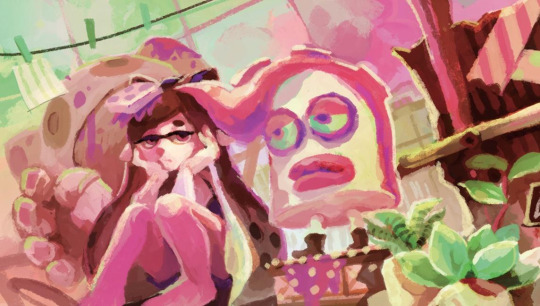
I'm sorry if I'm coming off as really angry, i am. It's just, my brain is really hyperfixated on this squid and she means a lot to me. Seeing the way the fandom as well as the writers treat her makes me really mad. I hope i can find some peeps who feel the same way as i do. Misinformation is so frustrating man... i dont even wanna get into the Octarians because that's a whole other can of worms... anyways im done ranting. have a good night or good morning wherever you live y'all.
#splatoon#splatoon 2#splatoon 3#callie cuttlefish#callie splatoon#rant post#complaining#sorry for the rant#octo callie#dj octavio#marie splatoon#marie cuttlefish#octo canyon
254 notes
·
View notes
Text
Y'know, it occurs to me - Movie!Sonic has a lot more in common Shadow than any other version of Sonic that I know of, and that creates a unique storytelling opportunity that wouldn't have been possible before.
Because originally, Shadow having a dark and traumatic backstory was what separated him from Sonic. Their similarities came out more in their confidence, their playful attitude, and even their withdrawn demeanor (though Shadow's is more extreme). Sonic's genuine ability to be carefree and optimistic was his biggest difference from Shadow.
In the movies, Sonic is... not nearly as put-together. Just like Shadow, his personality is shaped almost entirely from the result of tragedy. Both of them had to watch their closest family member get shot trying to save them from raiders (who were specifically targeting them for their powers) by sending them to Earth. The difference here is that, for Shadow, this event is fresh in his mind, while Sonic's had ten years (give or take) to accept what happened and move on.
Except, there's more, because losing Longclaw is itself not the main thing informing Sonic's character - it's the fact that he spent those next ten years in near-total isolation. Also similarly to Shadow, he took the last words his family said to him very seriously, and she told him to stay hidden no matter what. Combine that with the natural fear of what being found did to Longclaw, and the majority of Sonic's life has been spent hidden away, looking out at the world but unable to participate in it.
Remind you of anyone?

(I swear if the movie doesn't make a point about this parallel specifically I'm gonna lose it)
Normally, Sonic is a silly and upbeat character because that's just how he is by nature, and the feelings he keeps to himself are rarely detrimental to his health. In the movie universe, Sonic is silly and upbeat because he needed to be that way in order for his life to be bearable.
His constant chatter isn't quirky for the sake of it, it's a habit he developed out of necessity because there was no one else to talk to. He compulsively needs to fill the silence because not doing that would only reinforce how alone he was, and it's something he can't shake off even when he's not by himself anymore. His primary method of handling his feelings is to ignore them until they literally explode out of him with lightning firing everywhere.
All of this to say, a Shadow meant to be a foil to this Sonic is going to look very different from the Shadow we're used to. From what little about the movie's events have been described as of writing this, I'm inferring that Shadow's actually going to be a lot more open about his motivations for revenge than he was in the game, and that puts Sonic in the very interesting position of being more closed-off than Shadow.
Because sure, he might try to connect with Shadow's pain like he did with Knuckles. But because Sonic and Knuckles's history was so directly connected, they didn't really have to... talk that much about it. Sonic could acknowledge that they both lost their families a long time ago without having to go into detail about it or the aftermath. And because it had been so long since it happened, it was a lot easier for them to put it behind them and move on.
Shadow can't do that, because for him, Maria was lost very recently. He's not going to accept "you can move on and find new people to care about" as an option, and Sonic can't very well tell him to just ignore it like he did, either. Shadow isn't going to do the whole repression shtick.
For the first time, getting through to Shadow may just depend on Sonic being able to acknowledge his own pain, first. After all, how's Shadow supposed to interpret Sonic, if not as some random guy with a perfectly happy family and an obnoxiously happy attitude telling him that he needs to just, get over what happened to him? How can that come across as anything but naive and shallow without understanding how much Sonic suffered to get to this point?
(It's still a little naive and shallow even with that in mind, but the reason for that isn't because he has no perspective on what experiencing a violent tragedy is like - it's because his only known way of handling it is to leave it in the past and Not Think About It)
Though I do wonder if there's room for Sonic to initially clam up on his emotions even more after meeting Shadow for a bit? Like, he learns to some extent what happened, and is like "aw jeez if this is what could happen if I let myself be more upset about my lot in life then I REALLY need to reign it in" which is the exact opposite lesson he needs to learn but would be really interesting to watch
Point being, I think Sonic and Shadow are being set up as even more like mirrors to each other than usual, and I can't wait to see what they do with that potential
#sonic the hedgehog#shadow the hedgehog#sonic movie#sonic wachowski#movie!shadow#sonic movie 3#analysis#meta#On principle I'm not a fan of Shadow being written to be more open and therefore less subtle#BUT I do see the potential for it working really well in conjunction with this Sonic specifically
245 notes
·
View notes
Text
Daniil why would you say that???
Watching Pathologic (classic HD) while on break from suffering in Pathologic 2, and it really struck me how different the first meeting with the Bachelor was in each game.
Pathologic 1, well, only a screenshot can do it justice,

(Yes . . . far be it from me to call myself a person of mystical inclinations. However, when I look at you, I get the feeling that nature is playing jokes on us. It is as if both the left and right hand have clutched the head to realize for the first time they are two parts of a single whole.
>Why?
>I get that feeling too. Does that mean that we are alike?)
That's like the first thing he says to the Haruspex, and while yeah everybody in Pathologic talks like that to a degree, even in game, in character that's a wild thing for Dankovsky specifically to say.
We just spent an entire playthrough as this guy mocking and/or having breakdowns over the existence of the supernatural - especially precognition. And in strolls this 6'2 resting murder-face dude with half-a-medical degree, widely thought to be a serial killer (kinda true), and Dankovsky's like,
"BTW, my heart is telling me we're kinda two halves of the same whole.😊❤️"
Absolutely hilarious. Even funnier is that the Haruspex, grumpy at baseline and currently having the worst day of his life (so far), can agree with him. Great first impression all around!
Then over in Pathologic 2, the Bachelor is high-key fumbling, like fumbling so hard you can get an achievement for it.

Carpetbagger - Remind a colleague of the Hippocratic Oath -- and fail
Not to meme on the guy (who is of course, multi-faceted and at his core deeply altruistic even if he often seems to have trouble expressing that on an individual basis), but initial Pathologic 2 Bachelorencounter is Daniel at his most prickly prick.
He gets Artemy's name wrong (possibly on purpose and definitely twice),
condescendingly demands the Haruspex be his errand boy,
basically calls himself the smartest person in a room of 2,
and can accidentally imply that he left a couple of orphan children to die because he doesn't treat mutts (he actually refused to treat the orphans' dogs).
Yikes - no wonder Artmey spends the first couple of Days taking cheap shots at the guy.
I mean in both Haruspex routes eventually he ends up very friendly with the Bachelor, which makes senses on a thematic level given the some of the Haruspex's major themes/ideals are connection and community. You could say their first meeting was changed to be funnier ("Vorakh") or more in character for the expected tension between two people under a lot of stress who can both be difficult to get along with at baseline
However, what about if we look at it from a meta-narrative level?

While you can play Pathologic 1 as either the Bachelor or the Haruspex on your initial run, it's pretty common knowledge who you are supposed to play first.
"Daniil Danokovsky's Fun Steppe Vacation was just the tutorial for Artemy Burakh's Tormentous Nightmare" - HBomberguy in Pathologic is Genius and Here's Why
This means that the player in Pathologic 1 has already been introduced to Daniil - even if Artmey hasn't - and the game reflects that! You the player know the Bachelor, you've been him, and you probably got really attached after keeping him alive for 12 horrible, horrible days.
Even though you know he can be a bit sanctimonious and dismissive, the player knows he's rational and compassionate and thus already used the evidence at hand to figure out Artemy hasn't killed anybody!
Of course one of the first things you (the player) would want to do as the new protagonist is check on your former avatar, and the game rewards you for it! Talking with the Bachelor on Day 1 as Artemy can raise your reputation - which is super critical. It might be the increase that keeps you from getting hunted in the streets or starving as shops refuse to sell food. What a great first (Second?) impression!!
Daniil's unprompted "hey are we soulmates or is it just me?" line is funny, but meta-narratively it is also true. They are the player's first two avatars, taking turns being puppeted by the same you as protagonists through the same overall story to two opposing conclusions. They are (your) right and left hand. You've played Dankovsky, (you) know this and having previously been the protagonist this new Dankovsky seems to subliminally know this too.
Meanwhile over in Pathologic 2, the only route is the Haruspex - disregarding the Marble Nest (worst day of Dankovsky's life [so far, ad infintuum]) which has enough time fuckery going on that I shall disregard it for this analysis - you can only be Artemy Burakh.
Either under the assumption that the player of Pathologic 2 hasn't played Pathologic 1 or that they've played all of Pathologic 1 including Changeling' Route's extended murder hide and seek between Dankovsky and Burakh, We (the player and Artemy) don't know Daniil when we meet him in Pathologic 2 as anything but the broken man we saw in the depressing into.
Is he our friend this time? Is he our enemy? Whatever he is, he's certainly a sanctimonious prick.

(Today's tragedy won't be the last. I was blessed with a naturally high intelligence, and my observations indicate that a very deadly visitor has come to this god-forsaken town. That's all I can say for now.
>...I don't like you, Bachelor Whatever.)
In Pathologic 2, both the player and Artmey meet Daniil Dankovsky at at his worst, and slowly work-up from there because both of us are meeting, getting to know, and building a relationship with him for the first time.
This is actually parallel to how you first meet the Haruspex in Pathologic 1 as the Bachelor!
If you are playing in the intended order, both the player and Daniil don't know anything about Artmey besides the serial killer rumors, and likewise you meet him at his worst - (in prison and later he murders a young woman to get Daniil the infected heart he needs to try and develop a vaccine). Much like we see the worst of Daniil's classism, arrogance, and inability to connect beyond quid pro quo (hehe, latin) in our Patho2 intro; in Patho1 we initially only see Artemy's standoffishness, brutality, and stubbornness.
Interestingly, following Daniil's themes/ideals of transcendence and rationality we (the player and Daniil) don't actually end up connecting much with Artmey on the Bachelor's route. The player is influenced by the puppet, and why would Dr. Daniil Dankovsky - whose route is plagued by betrayal, manipulation, and the difficulty of connecting to even people who do selflessly care for him (like Eva) - make friends with a violent, possibly dangerous guy who practices a sort of medicine Dankovsky doesn't believe in?
(I couldn't find a good screenshot for this, but mentally insert a picture of Artemy doing a roadside dissection)
Basically if Daniil is the player's protagonist he won't reach out, because in-character why would he?
If Artemy is the player's protagonist, Daniil will try to be friends in Patho1 (because of the player's previous actions affecting both avatars) or in Patho2 Artmey will eventually connect with him because that's in-character for him.
Overall, I suppose this means that Danii's instant and uncharacteristic buddy-buddy attitude with Artemy on the Haruspex route Patho1 is completely justified from a meta-textually narrative, as is his horrific fumbling in Patho2.
And it is also very, very funny.
#Pathologic#Pathologic 2#daniil dankovsky#artemy burakh#TLDR: You (the player) are making your former favorite and current favorite doll bestest friends#No idea what any of this implies for the changeling's route#this isn't really a shipping post but u could take it that way#long post#pathologic spoilers
104 notes
·
View notes
Note
do you have any tips for writing a low empathy character who isn't evil? Or how to make an interesting apathetic character who's a thoughtless sort of evil? These are two different chatacters btw-
I tried looking up examples and stuff but uh. It's been a bit fruitless.
Honestly it's not too hard! Having low empathy just means we're bad at automatically "connecting" to the feelings of other people. You can come to understand it's not even a character flaw once you uncouple the idea that Empathy = Kindness. And apathy, well, that one's a bit more complicated imo.
Low Empathy
In English, it's just unfortunately super common to conflate Empathy and Compassion. To have compassion is to be aware of the suffering of another person, and ergo, want to help stop it. To be empathetic is to identify with and understand the feelings of another person. These are different things.
For an example in action; imagine a medic with a patient whose shoulder is dislocated, and xey'll need to pop that arm back in place in order for the patient to feel better.
A medic feeling EMPATHY for that patient is having an emotional response to what xey're seeing. Xey might have a tingly "ghost pain" thinking about the injury, and xey might feel guilty xey're going to put them in more agony, but also joy because this patient is going to feel much better in just a moment.
A medic feeling COMPASSION for that patient is thinking about how the shoulder must be causing a lot of pain, and knows xey have the skill to fix it. Xey know from xeir own experience that pain sucks and so it is a bad thing that needs to go away. It will hurt a little more for a moment, but then there will be immediate relief.
This is imo, why a lot of low empathy people are "bad at" comforting people without going to Autism College where they give you the scripts of Shit Neurotypicals Say. We're not trying to be selfish when we end up making "comfort sessions" about ourselves-- that's what we think empathy is, because we don't have a lot of it to really know what you want.
Like, doesn't it make sense to you? "I don't know what you're feeling. Here's a similar situation I've been though. I must know what you're feeling-- does that make you feel better? That you aren't alone? I think that's what empathy is, am I right?"
A LOT of low empathy people go into medical fields, the funeral industry, and disaster relief. We often really do want to help people so seek these fields out, or when we get there, just end up not getting burnt out like our high-empathy peers!
Apathy
As for the apathetic character, honestly, I'd suggest thinking about your story's themes. Villains are very special to me and I always try to handle them with care. What are you trying to say is bad to not care about in your work? How does their apathy play into the story you're trying to tell?
A Captain Planet villain is completely selfish, and exists only to benefit itself by exploiting nature in some way. Then the Planeteers show up and punch it in the face. Boiled down to its barest, most simple essentials; "We have conflicting goals and so I will stop you."
Personally I find total apathy to be something not especially compelling in villains, for that reason. Like, if you really don't care about anything, why bother with the trouble of going against the protag? Motivation is meant to be MOTIVATING.
(also ngl I'm on the Shadow As A Hero sort of bandwagon where I find it much funnier for the simple apathetic cool edgy guy to be the funniest person on your tennis team)
Dungeon Meshi has TWO characters who struggle with apathy, and are both antagonists at some points in the story, but never villains. Shuro and Mithrun. The theme of Dungeon Meshi is the beauty and complexity of life, the value of living, and how our connections to others changes the people we are. Food is a metaphor for bonding, self-care, and understanding.
For Shuro, he begins the story as someone who's both been encouraged to bottle up his emotions for the sake of other people, as well as to not actually consider the emotions of those lower-born than him. He's from a very different place than the other members of his party, and this causes friction as class, culture, and sophisticated, refined, weapons-grade autism clashes.
When the woman he loves is eaten by a dragon, he doesn't stop to tell her brother and """childhood friend""" what he's planning, as if they both wouldn't run in and get hurt. He owns demi-humans. He doesn't consider his own needs or the needs of his rescue team of loyal vassals. As a result, he's too weak to continue, losing a fistfight with one of the main characters, Laios.
After this, he connects with him for the very first time, and reaches out to him by giving him an important magic item. There's even a MASSIVE moment where he outright tells Laios that his ability to be so open (read: not have to mask his autism) is something he envies, breaking through that veil of apathy he wears.
The story Dungeon Meshi is telling here is that it is important to value the needs of yourself and of others. Shuro's apathy towards his own needs in a bid to prove his love weakened him. In acting like he was above his old teammates, he never spoke to them like people to smooth out his issues. He's never even noticed how much his vassals love and care for him.
(and the incredible irony is not lost on me, that Shuro's name is because Laios mispronounced it and was never corrected... while Shuro never noticed that Izutsumi had the unwanted name "Asebi" forced onto her when she was "taken in" and made his slave.)
See how that comes back to the theme? Shuro doesn't exist to just "be some asshole" or act like a villain. He has a full character arc that contributes to the narrative.
For Mithrun? I won't even spoil it. Go read Dungeon Meshi. Watch elf depression. We love a king with strabismus.
Anyway,
If you ever need good personal resources on any stigmatized mental condition, I've found it's usually productive to go into the #Actually (Thing) tag here on Tumblr. You can find people posting about basically anything. I found a lot of really good resources on NPD that way.
183 notes
·
View notes
Text
I. Introduction
A while ago, I wrote on how Jack Slash was a prime example of how Worm approaches metatextual commentary. Wildbow has a general tendency in his first two serials especially to identify common story tropes and give them in-universe justifications. Jack Slash in particular is a response to the tendency for writers to give plot armor to the Joker and similar sorts of popular villain characters. The out-of-story justification of the authors ("we can't have someone just shoot him, that's boring, besides everyone loves this guy look at him go") becomes an in-story aspect of his powers: an ability to subtly influence other capes behavior allowing him to always escape danger. Plot armor transformed into an in-universe mechanic that characters are aware of, react to, and work against.
Notably, this tendency is never used to highlight the status of wildbow's characters as characters— there is no fourth-wall breaking or attempts to undermine the audience's perception of the story as containing essentially a self-contained world running on its own internal logic. But this certainly isn't the only way you could comment on Joker-type charcter's plot armor: Funny Games covers similar ground using the opposite trick, repeatedly having its home-invader villains draw attention to how they're characters in a story, and that whether they win or lose is determined wholly by the author's will. Director Michael Haneke continually draws his audience into the story only to violently and repeatedly pull them out with suspension-of-disbelief-shattering acts on the villains part. It's The Treachery of Images as a horror movie.
Together, Worm and Funny Games showcase two different approach to explaining why the villain gets to live another day. If you can explain their deal using only the internal logic of the story ("Jack has a power that lets them escape consequences"), then the author is giving a diegetic justification for the trope justified by mechanisms of the story's universe. If you can't explain their deal without reference to them being characters in a narrative ("Paul can talk to the audience and rewind time because he's a fictional character and can do whatever the author says he can do") then its a "narrative" or nondiegetic justification for the trope.
These can be combined. Seidlinger's Anybody Home? used them together for awkward effect: serial killers perform acts that get recorded by some mysterious "camera" that produces a log of their events, which through mystical and mysterious means gets distributed to film producers and adapted into horror movies. Killers have fully "narrative" reasons for following horror tropes—they know they have an audience and are behaving for their benefit. But the story suffers from its awkward in-story justification, its "mechanical" framing: the audience the killers are acting for are other people within the story's universe, not the readers of the book. Characters realize they're "victims" in a story, but they're framed not as existing fully for the story but as normal people who got caught within a story, stuck in it like one gets caught in a storm.
In this post I want to highlight some more elegant ways of combining the mechanical and narrative approaches to metafiction, especially in regards to plot armor. I'll be commenting on wildbow's second serial Pact, Homestuck, and Eidolon DISKA, and heavily spoiling all of them. I've divided them into sections so readers can avoid spoilers or skip over works they're uninterested in, though they're not separate essays. I'd maybe recommend checking out DISKA if you haven't. Its great. Alright then.
II.
Pact and the otherverse gives its characters diagetic reasons for following tropes that align with narrative rules though its magic system. Otherverse magic largely involves telling the universe a story and hoping that your behavior has enough symbolic resonance that it believes you. A lot of the magic spells work on a "I dunno, this feels like it would work" logic.
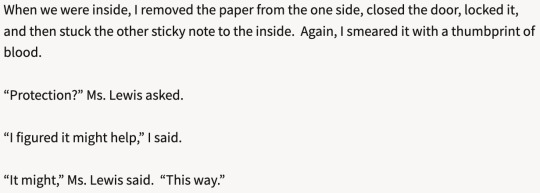
This means that characters need to be aware of how characters in good stories would act, and often need to behave in a way that is believable if they were characters in a story. The result is that Blake Thorburn ends up purposefully trying to emulate a monster from a horror story, purposefully playing into the tropes of such a character. He acts like a specific type of story character, not because he's broken the fourth wall and knows he's in a horror story, but because he knows convincing the universe that he's a horror villain will likely lead to the universe letting him survive just a little bit longer before he collapses into an exsanguinated heap.
However, Pact's approach to the specific mechanics and abilities of Blake and other monstrous entities of his ilk is much more in-line with how wildbow previously approached Jack Slash. Horror-movie style monsters are a grab-bag of entities called "Boogeymen" within the setting, with little in common outside of previously being people who had fallen through the cracks of reality and climbed out of the abyss changed.
The tropes of slasher movies are once again given mechanical justification: the monster drives conflict and acts unpredictably because being feared gives its more of a foothold in reality. It can't stay dead (and keeps returning for sequels) because it can always climb back out of the abyss again, or be summoned by Scourges to be used against their enemies. Some of the ways the in-universe boogieman mechanics reproduce these tropes are explicitly narrative justifications—they're stronger if the universe sees their ends as especially "iconic," and Blake seems to be empowered the most when he leans into character and goes on a rampage— but for the most part, you could explain their deal without having to refer to their roles as characters in a narrative.
III
The same couldn't be said for Homestuck's take on the serial-killer trope, which is explicable pretty much only in non-diagetic terms. Which is interesting insofar as its one of the only parts of Homestuck that doesn't at least provide a diagetic fig-leaf for a character following a cultural script.
Much like Pact's Otherverse, Homestuck also formalizes many narrative tropes as diagetic, in-universe mechanical laws of its setting. However, it doesn't bother giving justifications for why the setting has such mechanics. There's no equivalent to "they're like this because the magic of the abyss;" Homestuck's mechanical rules are almost more in the Funny Games vein of being inexplicable if you don't accept that they're the consequences of this being a story.
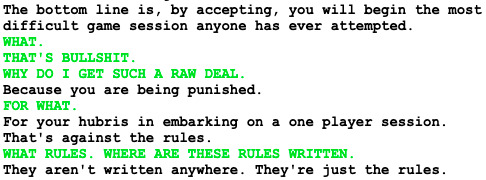
But the narrative rules it draws attention to are often all its own. See, in some ways the setting of Homestuck is meant to be an obvious set of fantasy Bildungromane. The characters enter a game world, Sburb, and are each deposited on a planet with almost stock templates: Land of Wind and Shade, Land of Heat and Clockwork, etc. Each are filled with a population of simple game constructs with little personality outside of what's needed to drop lore tidbits, and a slumbering denizen connected to a personal quest tailor-made for the player. This sense of "generic fantasy world made for a generic fantasy quest" is heightened by Homestuck's constant references to other media containing famous lands constructed from fantasy stories: Peter Pan/Hook, the Wizard of Oz, Alice in Wonderland, Don Quixote, and The Neverending Story. (That last example makes up not only a substantial amount of aesthetic references, but also structural echoes; as Homestuck copies it by having a second half in which reader-stand ins enter the story, characters go from one world to another, and the role of author and audience gets muddled in a world-threatening manner.)
It seems like the game Sburb created the players different worlds to facilitate a typical Bildungroman adventure. Enter the fantasy land, meet the locals, learn the lore, defeat the monster. Unlike Jacob's Bell, The Lands of Homestuck don't make sense as anything besides a game construct, a way to facilitate this narrative arc. And the character's tendency to sidestep the quests set up by the Lands and skip through or break things feels like a subversion of those typical sorts of fantasy stories.
A complicating factor, though, is that the game was set up with the expectation that the players would skip around and break things. The entire game is composed of a series of time loops, including the characters creating themselves, creating the big bad in an attempt to defeat him, etc. Everything that happens in a game session was engineered to happen "by" the game—including the parts that seem to break the intended narrative arc of the Lands. There's plenty of things that seem to be breaking the "intended" experience: Rose taking apart her game world, Vriska reading the mind of her Land's consorts to find out all the lore they have pre-programmed in, Jack Noir killing the Black King before the players could face him as the intended final boss. But all of these turn out to be essential conditions for the game coming to exist in the first place, for the characters to create themselves, for the Lands to be created as game constructs in the first place. The game creates conditions that require the players to "cheat."
In other words, its not just that the comic is subverting a typical fantasy story. Its that Sburb itself is a game that runs on the narrative rules. Not the narrative rules of a fantasy Bildungroman, but the narrative rules of a subversion of a fantasy Bildungroman. The subversion is expected and built-in.
This subversion-as-the-rule is something Hussie enjoys making the narrative conciet of a story: early Problem Sleuth was written with the one rule that the audience could never be right about how the main character's office worked. Its also a feature of Homestuck's general approach to characters and dialogue. I think a good example of this is Eridan and Feferi's early conversations. They get introduced as the primary examples of a form of alien romance the narrative just got done explaining, a pair of moirails that the narrator declares are "made for each other". But of course, the subversion of that is already built in, as before Eridan's full introduction we learned that he wanted to be in a different relationship with Feferi. So when the first few on-screen appearances of these characters turns out to be their break-up texts, its a "subversion" of the destined romance the narrator set-up, but its a sign-posted and expected subversion.
But back in terms of Sburb's mechanics: players of the game who perform a ritual to achieve god-tier status can only die if their death is either Heroic or Just: that is, they can only die if it’s narratively satisfying. If a powerful character dies without it being a satisfying heroic sacrifice or a satisfying end to a villainous rein of destruction—in other words, if the death is uninteresting and narratively pointless, then the character pops right back up. Like in Worm, plot armor is a mechanic of the setting that the characters can find out about and exploit, and like with Pact's boogeymen, characters become whole new types of beings as part of fitting to a character narrative that'd require plot armor. But unlike in wildbow's work, Homestuck's God Tiers have little in the way of diagetic justification. Hussie knows that there are situations where an audience won’t accept the stakes set out before them—they can tell that the bad thing can’t be allowed to happen, because if it did the plot couldn’t continue or the story would suffer, so they know the bad thing won’t happen. Accepting this, they play around with the trope by having it literally impossible for the bad thing to happen if the story would be worse for it.
But where it gets weird is how this plot-armor mechanic gets applied to Gamzee, in one of my favorite sections of Act 6. Gamzee was introduced as a joke character riffing on the juggalo evil clown subculture, who later goes on a murderous rampage for reasons that are never made fully obvious in-text. He then scuttles about the story as a figure who keeps breaking the story’s rules: both the mechanical rules of how Sburb works and the rules of storytelling generally. This ramps up a lot in Act 6, where he puts on a fake god-tier outfit and starts showing up at times and places he should not be able to be based on the established mechanics of Sburb, which up until then had been incredibly strict parameters on the story. Unlike a lot of the items that loop back in time in convoluted ways, we don’t see how Gamzee appeared on Jane’s planet, or went to the future to raise the cherubs, or all the other shit he gets up to. And we aren’t given a reason for why he’s selling blood like an RPG merchant or why he’s raising the big bad or why he’s doing anything at that point. He becomes a deus ex diabolica, a character whose not really a character at all so much as someone who sets up the obstacles in the story and has no reason for doing so besides the fact that the story wouldn’t work if he wasn’t there to set up the stakes.
One especially odd thing about him though is that even though he never actually reached God tier, he seemingly couldn't be killed.

At first this seems weird. Gamzee is breaking a core mechanical rule of Homstuck: he's immortal despite not being God-tier. But then you remember that the mechanical rule of God-tier immortality was already just a formalization of a narrative rule: a character can't die if the story isn't done with them. Homestuck is breaking its diagetic rules, but following the narrative rules they reflect.
This meta-interpretation of Gamzee's immortality is strengthened by the fact that the above conversation is taking place between Andrew Hussie and one of their characters. Furthermore, said character is a fandom stand-in who later transitions into being an author stand-in. This character (Caliborn) is the main villain of Homestuck, and has been interpreted as everything from the chains of narrative inevitability, to the interface of the webcomic itself, to Homestuck readers with an unhealthy relationship to the work, to the viler tendencies of Hussie themself present throughout the comic.
Not the only such stand-in; nearly all the villains of Homestuck assume some authorial role, as Hussie has an ongoing theme of equating the author role to being a manipulator. Thus the most heroic characters generally are reactive rather than proactive, thus Doc Scratch/Vriska/Dirk/etc all trying to author the timeline or claim causal responsibility for events while manipulating other characters, etc. But Caliborn ends up representing some more of Hussie's specific creative tendencies, and is the only character that Hussie's in-comic self has a conversation with.
Notably, this conversation has pretty much the only instance of Hussie presenting all the weird obstacles of Sburb as something they've set up as the author.
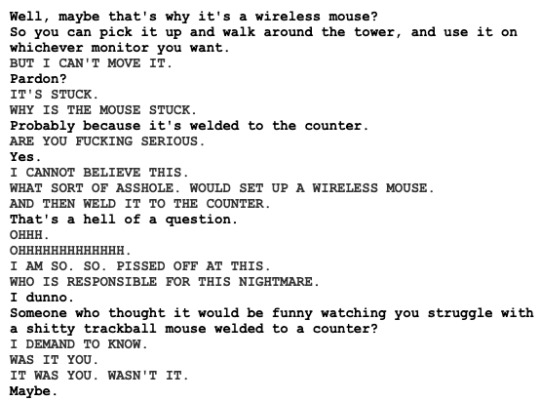
Oddly enough, apart from this, the yellow yard, and the Spades Slick sideplot, "Hussie" as a character has all but no role in the story. Which is in keeping with their (possible farcical?) ethos of all their characters existing as their own entities/character types, with Hussie just expressing them. The Entities in Worm actually end up being more direct author figures than Andrew Hussie's own self-insert, since they at least perform the role of authors (control characters in a way that produces dynamic and interesting scenarios).
This is a part of why the Hussie stand-in apparently lacks knowledge of their own story, and gets surprised by it.
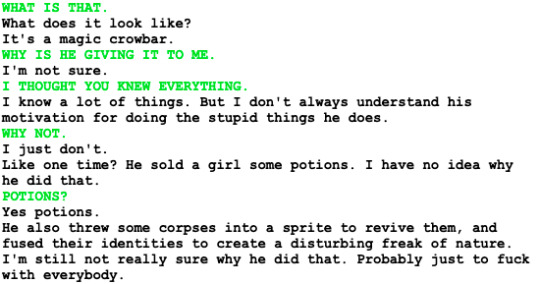

Hussie claims even they don't know where Gamzee got things, what he gets up to, or why he's doing what he's doing. The first two things are probably true, honestly. The actual author Hussie may not have an idea in mind for how Gamzee gets to any of the places he does, since its not really relevant to the story. It feels weird that he doesn't, since so much of the rest of Homestuck is tracking how various objects travel from one point in a timeline to another, but when there's no interesting answer to be constructed by the author none really has to be provided. Again, by this point Gamzee is a plot device that Hussie has dressed up as a funny clown for the audience's amusement, he's not really a character.
But if the Hussie stand-in is meant to be taken seriously when they say they don't know why Gamzee has the keys, then there's a disconnect between Hussie the character and Hussie the author. Since the keys do have a plot purpose that's revealed almost immediately, and that Hussie almost certainly had planned.
A weakness in metafiction generally is that having the author be a character in any real capacity lowers they're ability to be a true author figure. If the stand-in is surprised by something the author wrote, then they're not reflecting the author. If the characters kill the author stand-in, but the story keeps on going, then what the hell was the author representing?
IV
The only piece of metafiction I've seen that squared that circle is EIDOLON DISKA, which mostly suceeds because of its structure as an actual-play. It has a GM who serves as a narrator alongside being the voice of almost all the characters, but all the main characters are acted out by other people. So it can pull a lot of the standard metafiction moves in much more convincing ways. The narrator reveals that he's an in-universe character who they actually know, and whose been writing the story they're all in. When the player characters are still able to rebel and fight against the narrator, it works, because the PCs actually are representing other people making decisions apart from the GM. Even a character usurping the author ends up working, since it just means that character's player becomes the GM.
As you'd expect, EIDOLON DISKA is another piece that blends diagetic and narrative rules. Gods currently writing the story (aka the current GM) can't rewrite portions that previous gods wrote, because doing something so narratively unsatisfying would break their own godhood. Breaking the rules of the Eidolon rpg system also risks being usurped, since they're the narrative rules the story runs on, and the diagetic rules of Godhood are just narrative rules.
This gets most interesting when the characters end up dying, as will sometimes happen in an actual-play of a ttrpg where death is a mechanic. The podcast is divided into two time periods, with the first group being the founding members of their school's mystery solvers club. The second group are the members of the same club 20 years later, trying to solve the murder of the founders. Because the first group's death is a set event that the narrator already wrote would happen at a specific time, every time the characters in that first group die before that point, they have to come back. And once it becomes clear that they're characters, they become aware of this, and start abusing it. They take bigger risks, stop freaking out when their friends get hurt or killed in battle, start getting chatty with the increasingly annoyed grim reaper—in other words, they realize they have plot armor and start acting like it. Since they're aware of and secure of their plot armor, they use it more fully than Blake does. And since its an actual play instead of something written by one person, they're actually able to use that plot armor to be more than a villain thrown into heroes way like Jack Slash or Gamzee. DISKA isn't finished yet, but I have the most hope for it going into interesting places with plot armor out of any of these stories.
#wormblr#parahumans#homestuck#eidolon diska#eidolon playtest#wildbow#andrew hussie#Youtube#pactblr#otherverse#mals says
166 notes
·
View notes
Text
I think a lot about the way polydactyly is described in umineko ep1 because of the emphasis on the surgery to remove the extra digit often being done in early infancy (therefore without consent), with the intent of making the person "normal" while they grow up not even knowing about it...
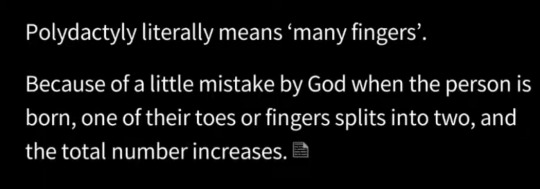
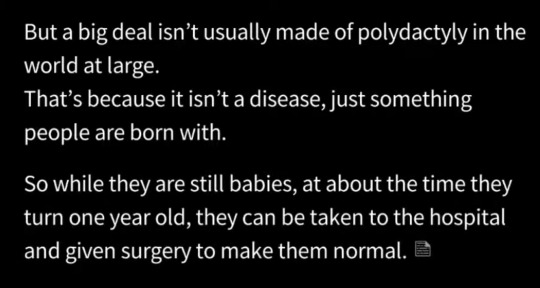
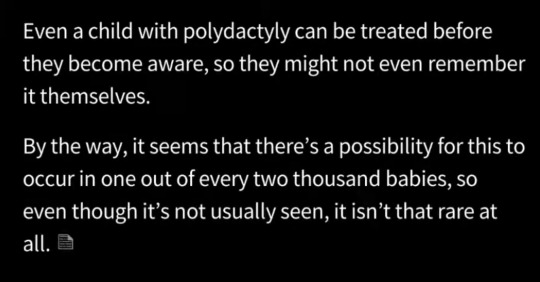
of course this hints at sayo having her extra toe removed to hide her relation to kinzo, but I can't help but think about how it's specifically described in a way that evokes infant genital mutilation, especially considering sayo's backstory. all of her character reads like an allegory for intersex experiences imo, which also adds to her trans narrative. a major source of her suffering lies in how her gender struggles were complicated further by the reveal that her body was operated on without her knowledge, which led to sexual dysfunction and infertility.
the narration talks about the polydactyly surgery and reiterates the topic of bodily autonomy (already a big topic in umineko's first episode with the discussion of reproductive commodification of women's bodies) by mentioning how infants can be operated on to "fix" a part of their bodies to fit the idea of what "normal bodies" are like. the parallel to the mutilation of intersex bodies is very obvious to me. in sayo's case it was done as treatment for physical injuries rather than a literal intersex condition, but the narrative centering the violation of her autonomy persists with how she has her body altered and is denied the truth, having never had any means to cope with the inherent trauma of it all because the priority of genji&co was always to cover up anything that could implicate kinzo. she gets everything on her birth records falsified and she is intentionally kept in the dark about her own life. her entire personhood is erased. again drawing parallels to intersex experiences, doctors and parents will lie about it your entire life if they can get away with it. it's not uncommon to only find out you were operated on and/or forced on hrt as an adult!
even umineko's overarching theme about the nuances of truth vs magic can be read as an intersex narrative... it's a common experience to find out you were being denied your truth and made to live a lie "for your own sake". that truth may be unrecoverable and kept from you forever and all you can do is grieve it. your body is made into a catbox. I don't want to get too personal but some parts of confessions were chilling to read because of how similar they were to my experiences as an intersex person and I had never seen these very specific things portrayed anywhere. of course I can't claim to know the authorial intent, but it hit hard even as an allegory.
intersex and trans struggles aren't 1:1 the same but they have a lot of overlap, especially in regards to bodily autonomy, medical abuse and the gender assignment of bodies upholding a strict binary. trans people are denied transition while intersex people are forced through it, so a character like sayo who portrays that intersection of being both with such care is very precious. her struggles are strongly rooted in transmisogyny, intersexism, class and family, all which had her systemically disempowered, dehumanized and stripped of autonomy and agency.
her actions are a desperate gambit to gain some control over her own life, to be in charge of the narrative even if it's through selfdestruction. the horrors in umineko converge into the theme of systemic powerlessness and denial of autonomy. to be made into a piece. all of it combined makes up the multilayered meaning of furniture.
#umineko#umineko spoilers#sayo yasuda#◇#♤#again crossposted from my twitter with only minor fixes so sorry about any awkward wording...
198 notes
·
View notes
Text
the light, and the glass
So there's this particular quality I have, as a fiction writer, and I have very little sense of how common or rare it is.
The quality is closely related to that famous Michaelangelo quip, about his sculptures being "already complete within the marble block":
The sculpture is already complete within the marble block, before I start my work. It is already there, I just have to chisel away the superfluous material.
This is how I feel, too, about my works of fiction. They feel like "real things" that "already exist," in some important sense, before I write them down -- or, indeed, before I even fully know what they contain.
So, for instance, if I haven't yet thought of an ending for a story I'm playing with in my mind, I nonetheless have a vivid sense that this particular story has an ending, and that this ending already is whatever it happens to be. It's only that I haven't managed to "see" it yet.
To clarify the point, consider the contrast between this thing, and two relatively familiar ways of thinking about how fiction gets made:
Conscious, goal-directed craft/artifice. Intending to write a Satisfying Plot in which each character has an Arc, the Story Beats follow logically from one another and are arranged with what is called Good Pacing, the proverbial Cat is Saved, etc., and "solving for" these desiderata in a conscious manner. Or, intending to create something much more outré and unsettling than all that -- but having some specific set of (outre, unsettling) intentions in mind, at the outset, and concocting/arranging the elements of your work in a conscious way guided by these intentions.
Free-wheeling, self-expressive "creativity." Just do whatever, man! Follow your bliss. The canvas is blank and anything is possible. Whatever you feel like putting into that empty space, go ahead and put it there. (The key thing being that, after "putting something there," you'll look and recognize something with origins in you, and your own whims and feelings at a particular moment.)
For me, though, the process of writing, and even of "ideating" (plotting, etc.), feels like a kind of transcription or channeling, as opposed to either of the above.
When I say "channeling," here, I don't mean that I have some actual, mystical belief in a supernatural object revealing itself through me. Not in the woo-woo sense anyway; whatever is really going on here, I am sure it "merely" involves the mechanics of the human mind, as implemented in the physical human brain and body.
But I do mean that it feels a lot like that. Like the story -- and not just the story part of the stories, but the whole thing, the "art object" -- has some real prior existence outside of me, first.
Like I am merely doing my best to "get it right," to be a perfect transmitter for the radio signal. To "do justice" to the "real thing," in the secondary act of writing words onto a page.
To be a courier who transports a valuable object from some originary otherworld into a place which happens to be called "existence" -- and to ensure, as much as possible, that it suffers no disfiguring scrapes during the journey.
----
I should say, though, that there's a lot of the "#1" above in my process too, the conscious-artifice thing.
Except... when I do that kind of thing, the intentions all come from the "real object," and my goal is to fill in whatever I can't see of that object so that everything I can see is preserved.
So: I will come to know, surely and indefeasibly, that the story must have some particular feature. (An event, a little moment, a character feeling a certain way at a certain time, even a specific turn of phrase.) Better to say: I know the story does have this feature. I see it in the marble.
But I can't see everything that's there, already, in the marble. And sometimes these glimpses-from-the-beyond are strange, inconvenient, difficult to "fit" into the current story (or perhaps into any story) in a natural-seeming manner.
And that's my task, when I'm doing the conscious-artifice thing: to take this collection of axiomatically-present glimpses, and build a structure around them into which they can "fit," naturally and even logically, just as if they were ordinary story-building-blocks like their neighbors, being placed here and there for ordinary story-reasons.
----
This has various implications. For one, it determines which kinds of writerly anxieties I suffer from, and which types leave me alone.
Like, I have virtually no self-doubt about my "ideas." About the overall, large-scale goodness-or-badness of the thing I'm creating. At least, not when considered "in principle," in an idealized sense that abstracts away from my actual capabilities as a guy who puts words on pages.
"Was this story, as a whole, a good idea?" is a question I find difficult to ask myself. Even when applied to smaller units, like specific plot points, this kind of question simply goes nowhere when I attempt to think about it. Insofar as my mind can cough up any answer, that answer looks like:
Yes
(after a moment, with mounting bewilderment) Yes, obviously -- how strange even to ask!
(after another moment, and as an afterthought) ...but if it weren't any good, is that really my business? It's not like I came up with it. I was asked to keep it safe and bring it into reality, and I take that duty seriously, but once it has reached its destination I wipe my hands of the matter. Don't shoot the messenger!
It's not, just, that I feel like the "real thing" "already exists." I also feel, always, that the real thing is... really good.
I deeply, thoroughly trust the Muse / Higher Power responsible for originally "making" this stuff. (To speak in relatively woo-woo terms, for ease and clarity.)
The Muse / Higher Power is a seriously skilled artist, much more so than little-old-me; if She makes any errors at all, they are not really mistakes, but "are volitional and are the portals of discovery."
And what's more, there is a sacred, unearthly gleam to the artifacts She makes, perhaps having something to do with that Fairyland, that place-other-than-"existence," in which they are originally made.
It feels like an honor to be designated as a courier for these enchanted things. Perhaps not a deserved honor -- on which more below -- but it's never the nature and value of the transported goods that I doubt.
(There is a definite sense of ritual to the thing that I do, here; a sense of connecting with some other place, definitively apart from our mundane here-and-now, and likewise more important/primary/etc. than the latter. Hence, perhaps, my tendency to not-write for long stretches, and then write in long sustained bursts for many hours at a time, which need a good deal of preliminary building-up-steam before they fully get going; it takes time to pierce, and then fully cross, the veil between worlds. And the various imprints of this stuff on the works themselves are not hard to see, once you're looking for them; they are of course especially transparent in TNC.)
All that being said, I do suffer persistently from a different anxiety.
When Michaelangelo said the thing about the sculpture "already complete within the marble block," he said it as... Michaelangelo.
As a famous, incontrovertibly masterful craftsman. Not a guy likely to suffer from doubts about his ability to put the chisel to the marble block, and reveal precisely that shape which was already there, inside.
But I'm not Michaelangelo. I'm not even sure I'm a good craftsman, much less a great one.
Certainly I've never conceived of myself in this way, even aspirationally. (Well, maybe I did in childhood and adolescence, but that was a very different thing from what I'm talking about now.)
I don't do what a person would do, if they wanted to be a Writer, and strove to be the best one they could. I don't, for the most part, practice my craft. I write because there's a Real Thing that only I can see, and it's not going to make into Existence any other way.
And since I don't write by habit or as practice -- since I only write at times when a Real Thing is in need of some incarnating-work, and I'm the only one around to do it -- I'm not exactly an ideal candidate for the job.
I am like a man who never especially wanted to be a sculptor, never practiced the trade, and was never more-than-ordinarily good with his hands, even... who is then, suddenly, struck with a very literal version of the experience Michaelangelo described.
Who, suddenly and inexplicably, begins to actually see a sculptural masterpiece lurking inside, whenever he looks at a faceless marble block.
What is our protagonist to do? Naturally, he will find a chisel, and begin chipping away. He will feel that these things need to be freed from their prisons, released and revealed to all the world, so that all the world can delight in them as he already does.
But he will be very aware of the unfamiliar way the chisel sits in his hand; of the way that hand trembles, and fails to meet the mark, and sometimes shaves off precious bits of what was really and originally a beautifully formed hand -- so that the hand, in the realized artwork, forever bears some oddity of shape which was not a part of what he saw inside the block, but only a consequence of his own shameful incompetence.
He will feel that his works, such as they are, are an odd mixture of amateurish craft and direct, divine inspiration. Insofar as he is Great, it will be because he has had Greatness thrust upon him, from without. He will feel, sometimes, that his successes have been obtained through a kind of cheating, not won fair-and-square.
And he will feel, always, a particular kind of (justified) impostor syndrome: an awareness that what he is doing, when he sits down before the marble block with the chisel in hand, is a very different sort of thing than what is usually called "sculpting," and what is being practiced by careful, hard-working aspirants just down the road, at the local workshop. The students there call themselves "sculptors," and our protagonist supposes he must call himself a "sculptor" too -- but he knows that behind this coincidence of language, a vast and strange chasm is hidden.
(I worry that this metaphor sounds flattering to me -- I am divinely inspired, they are merely toiling away and following the rules -- when I don't mean it that way at all.
In particular, note that there is nothing in our story to rule out some of the "real" sculptors down the road from also being visionaries who see the finished work in the block. Indeed, I got the metaphor from Michaelangelo, who was precisely this way.
I am only saying that all the conceivable configurations of craft/inspiration are in fact possible: just as it is possible to be skilled but uninspired, it's possible for inspiration to strike someone who lacks the capacity to fully realize its content. And that is how I feel, about my own attempts to create.)
----
When I was getting near the end of Almost Nowhere, and struggling with this kind of feeling, Esther would often reassure me by saying: "you are the light, and you are the glass it shines through."
In other words: you are a transmitter, and you are the source of the transmitted signal. Remember that in actual fact, the "real thing in the marble" came from your own little brain, just as much as the rest of it did. In actual fact, if there is a Muse and a Higher Power, it is really just an additional part of the same creature that holds the chisel, and worries over its trembling hand.
I did, indeed, find this very reassuring. And that's a funny thought, in a way! I imagine that for some people -- and indeed for me, in many other endeavours -- the same sentiment could easily have the opposite effect.
"It's all on you. It's all your responsibility. If any of it is bad, there's no one else to blame. If there is any 'Higher Power' at all, it is only the one inside you at all times, and not able to save you through unexpected intervention, from some true outside."
But I already believed, thoroughly, in the magical potency of the goods I was charged with transporting. If I was (somehow!) their maker, too, then (somehow!) the root of that glimpsed, alien magic was in me.
And so, perhaps, I could trust myself to ferry them into Existence without ruining, without even much dimming, the fairy-gleam from elsewhere that made them what they were.
256 notes
·
View notes